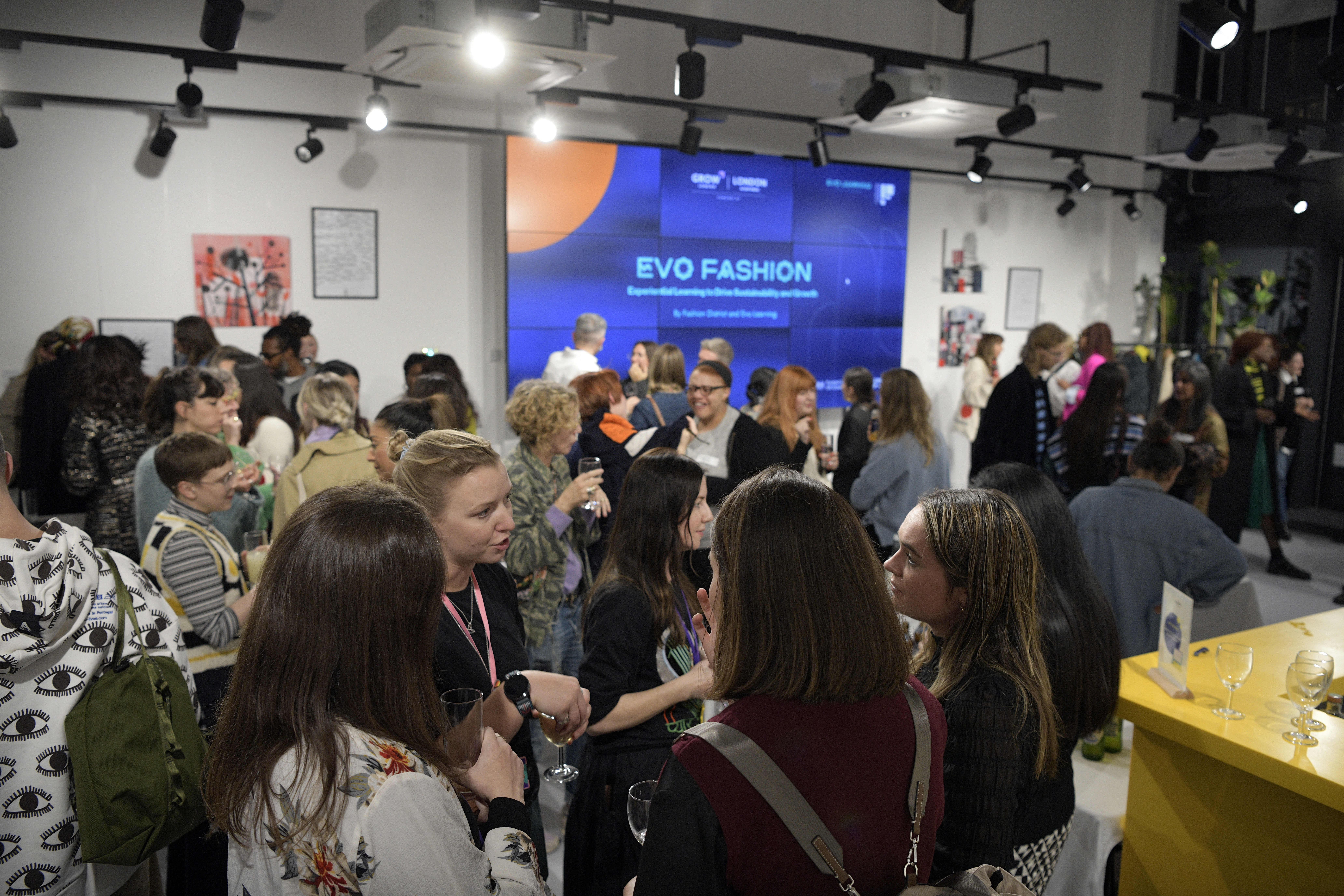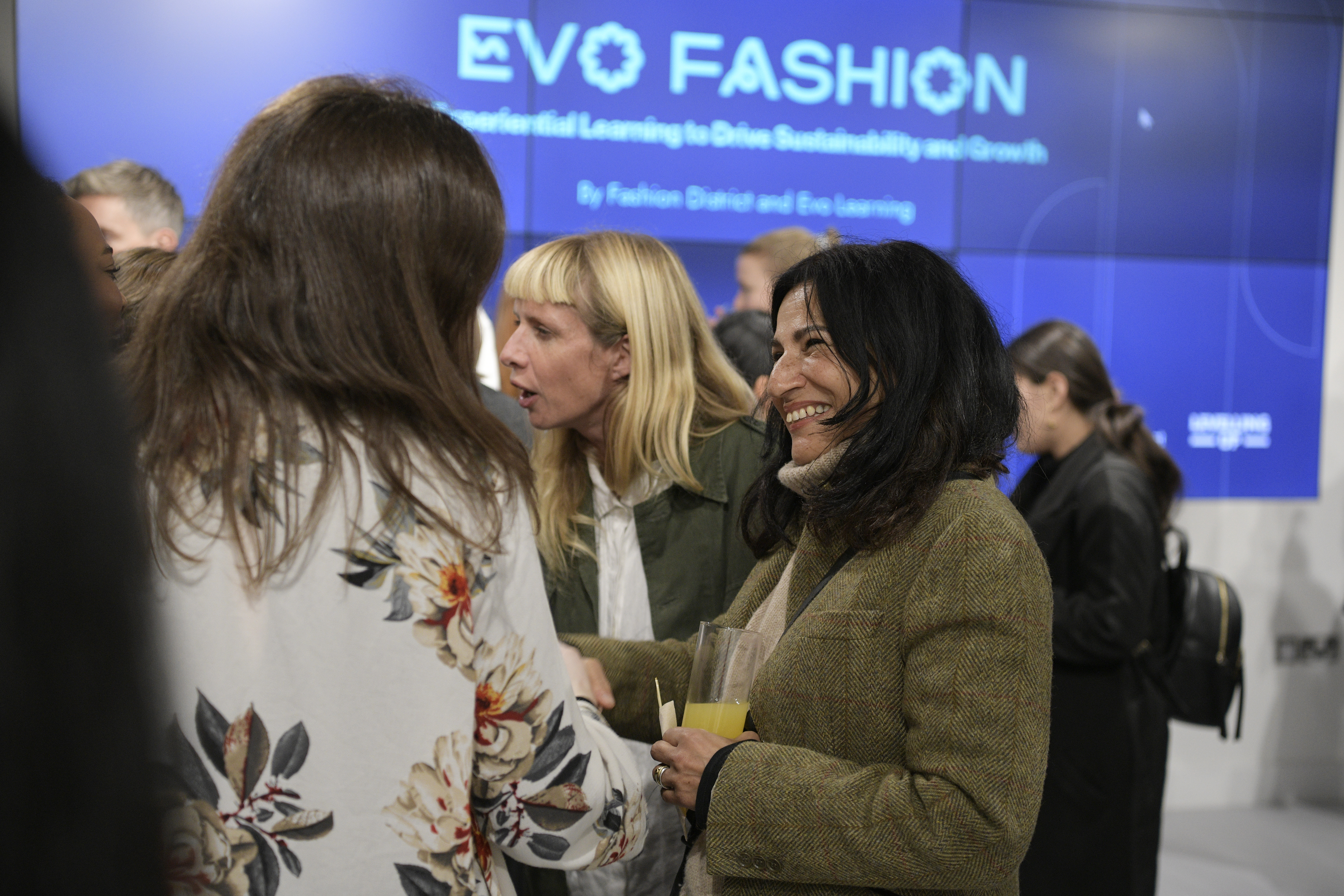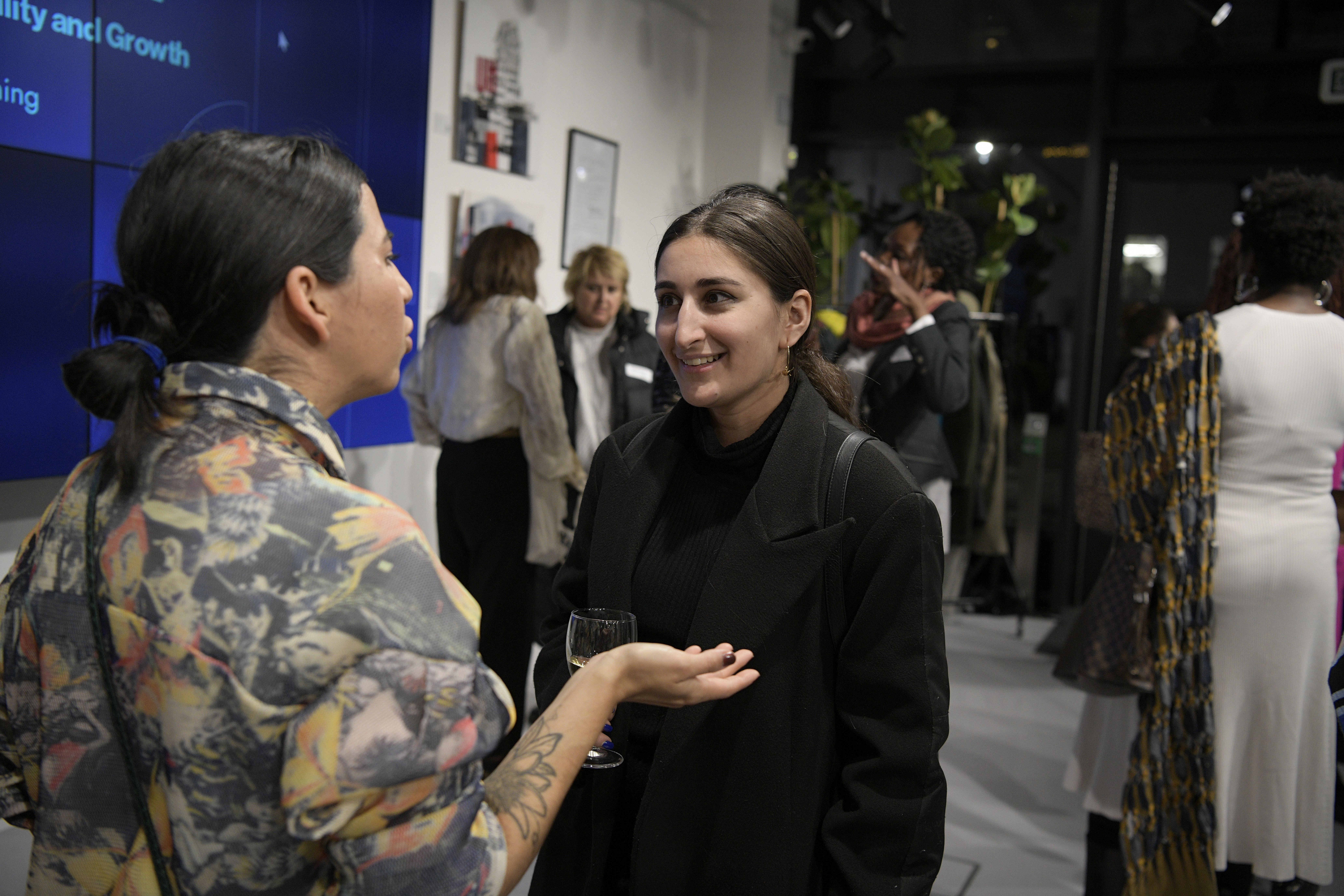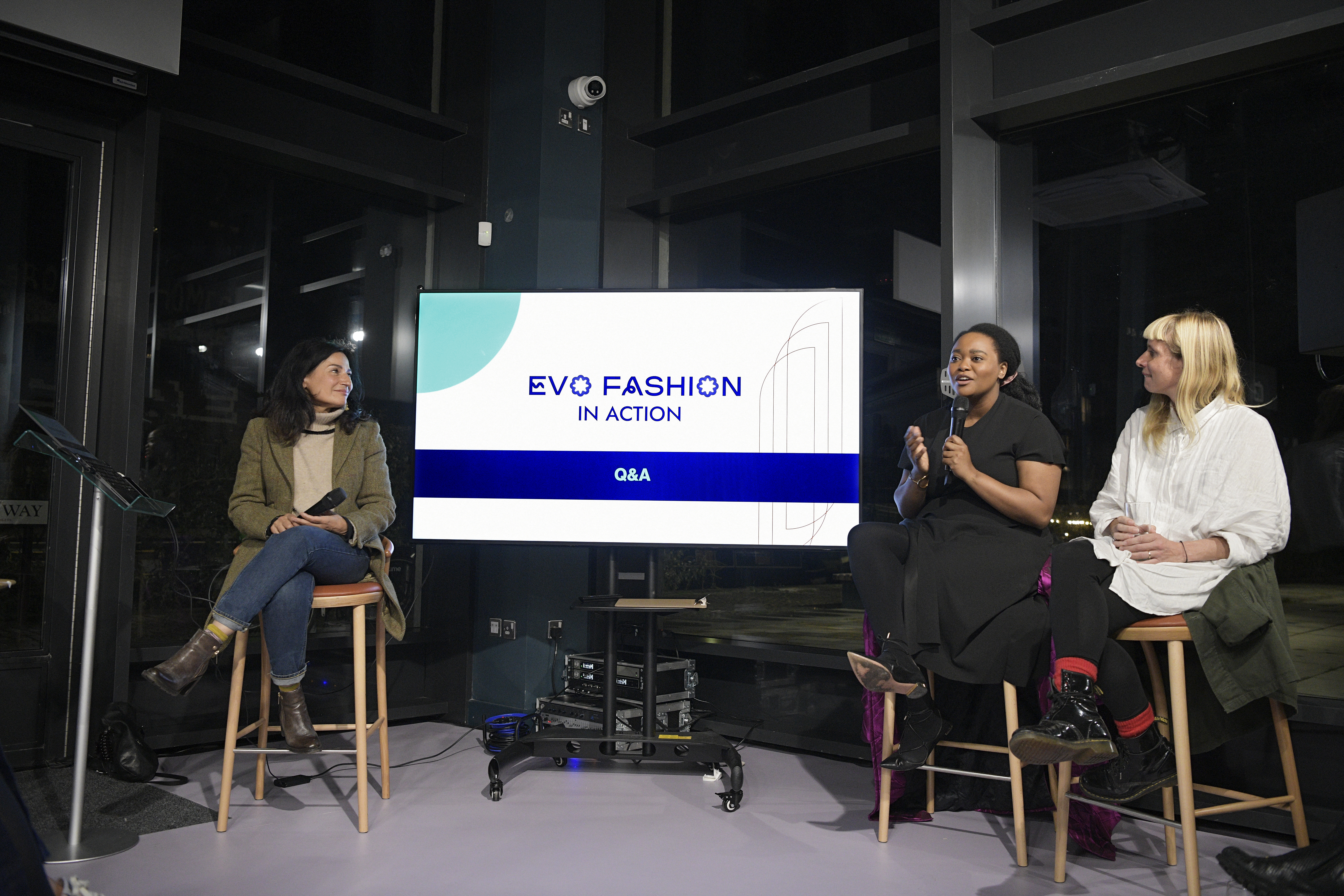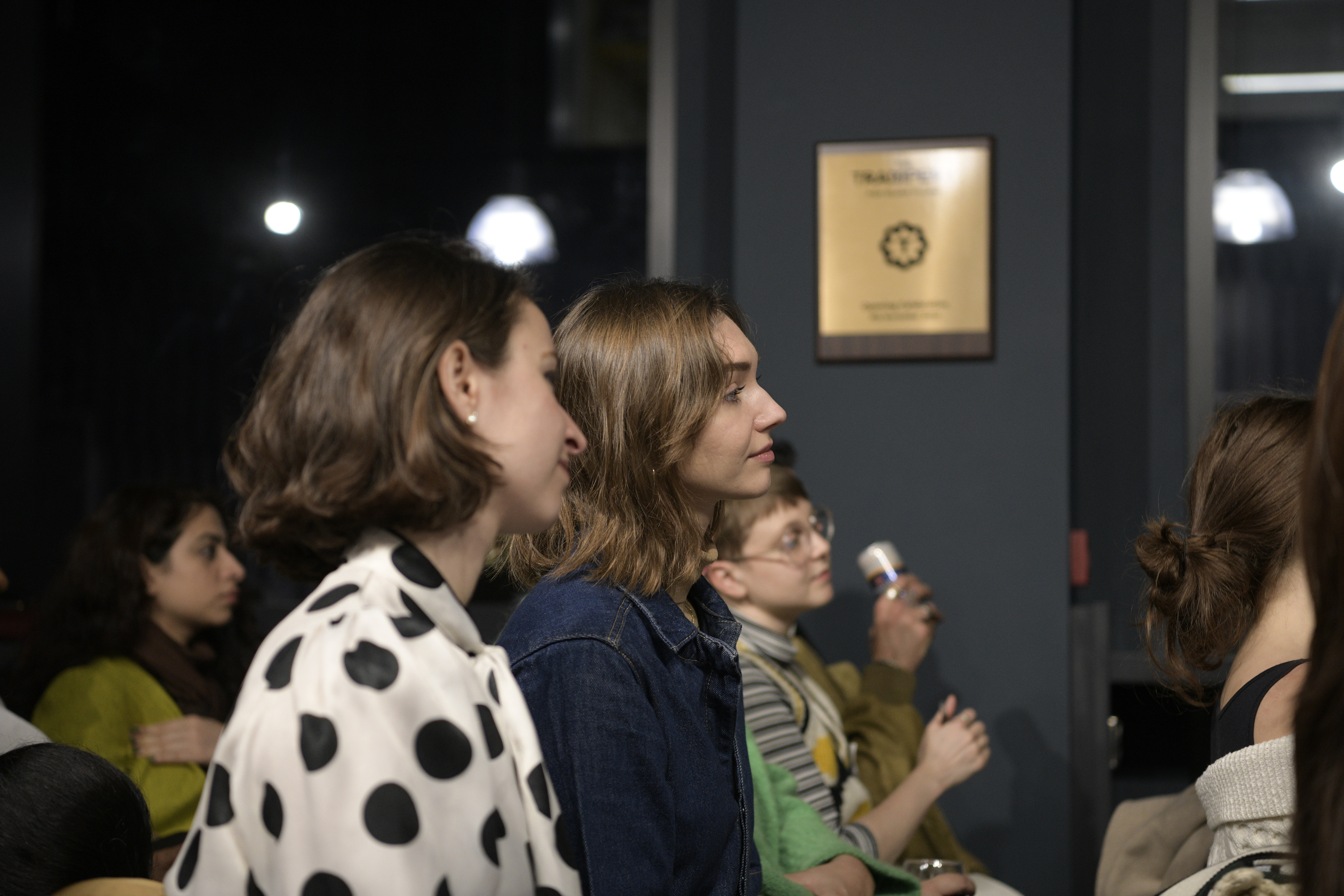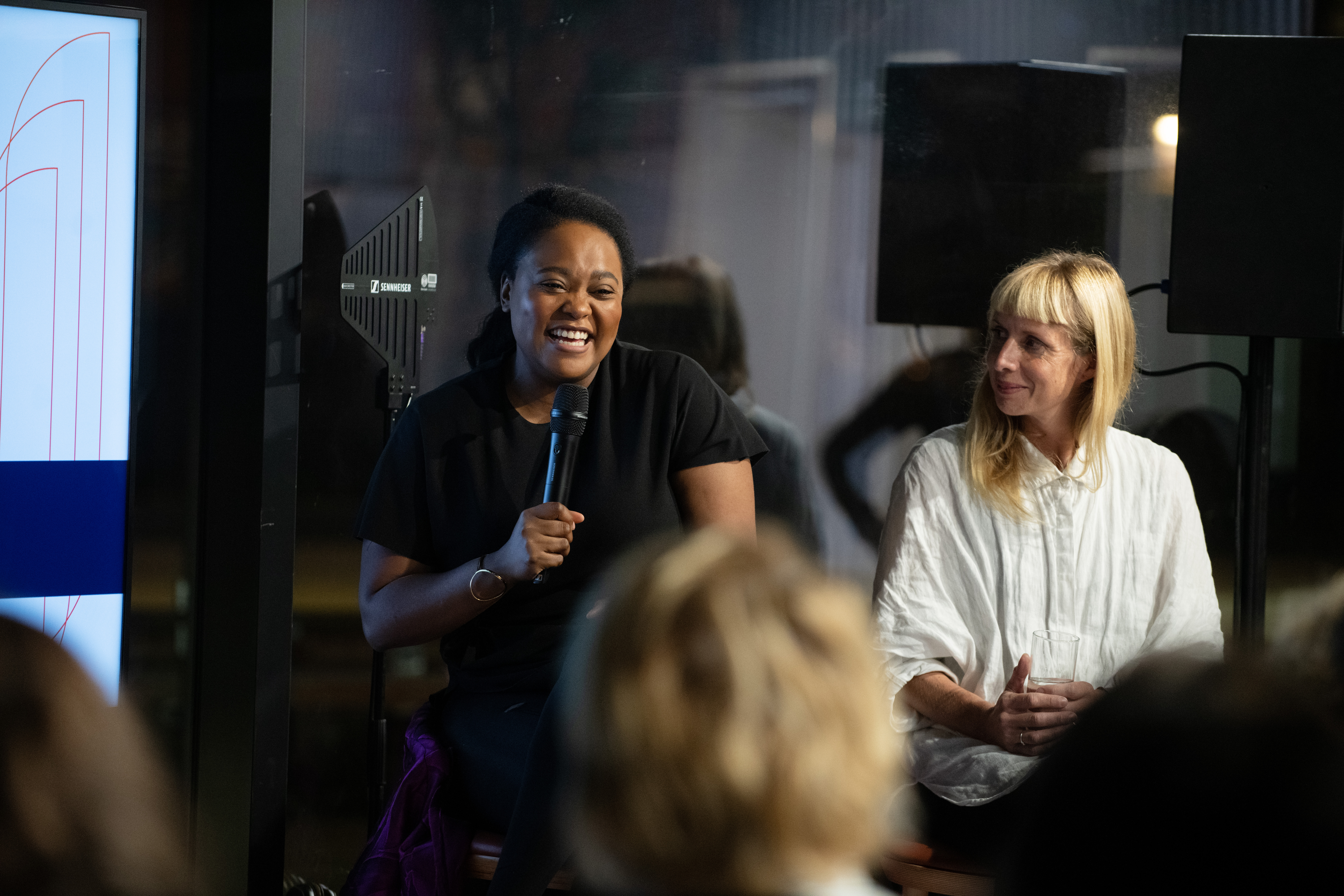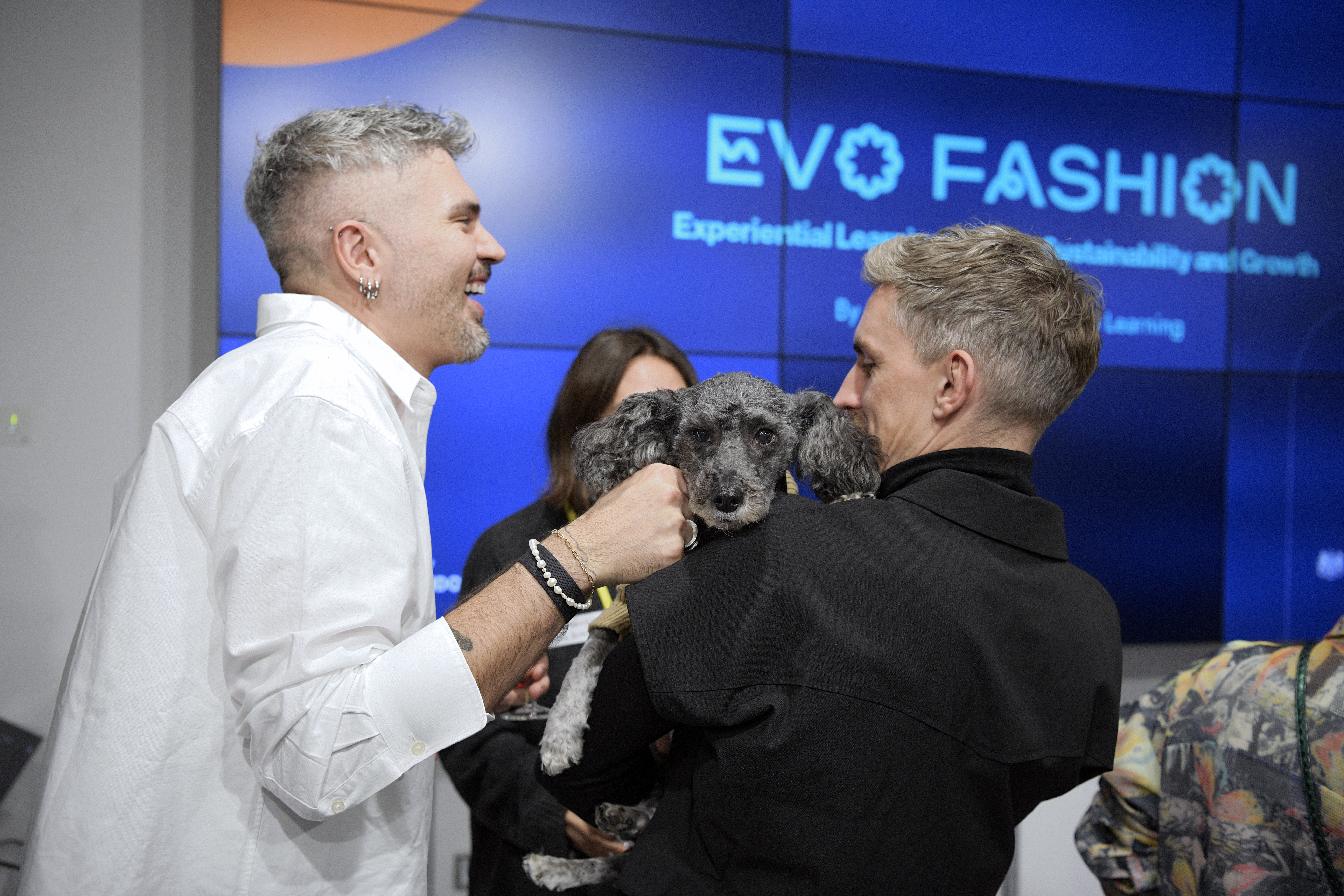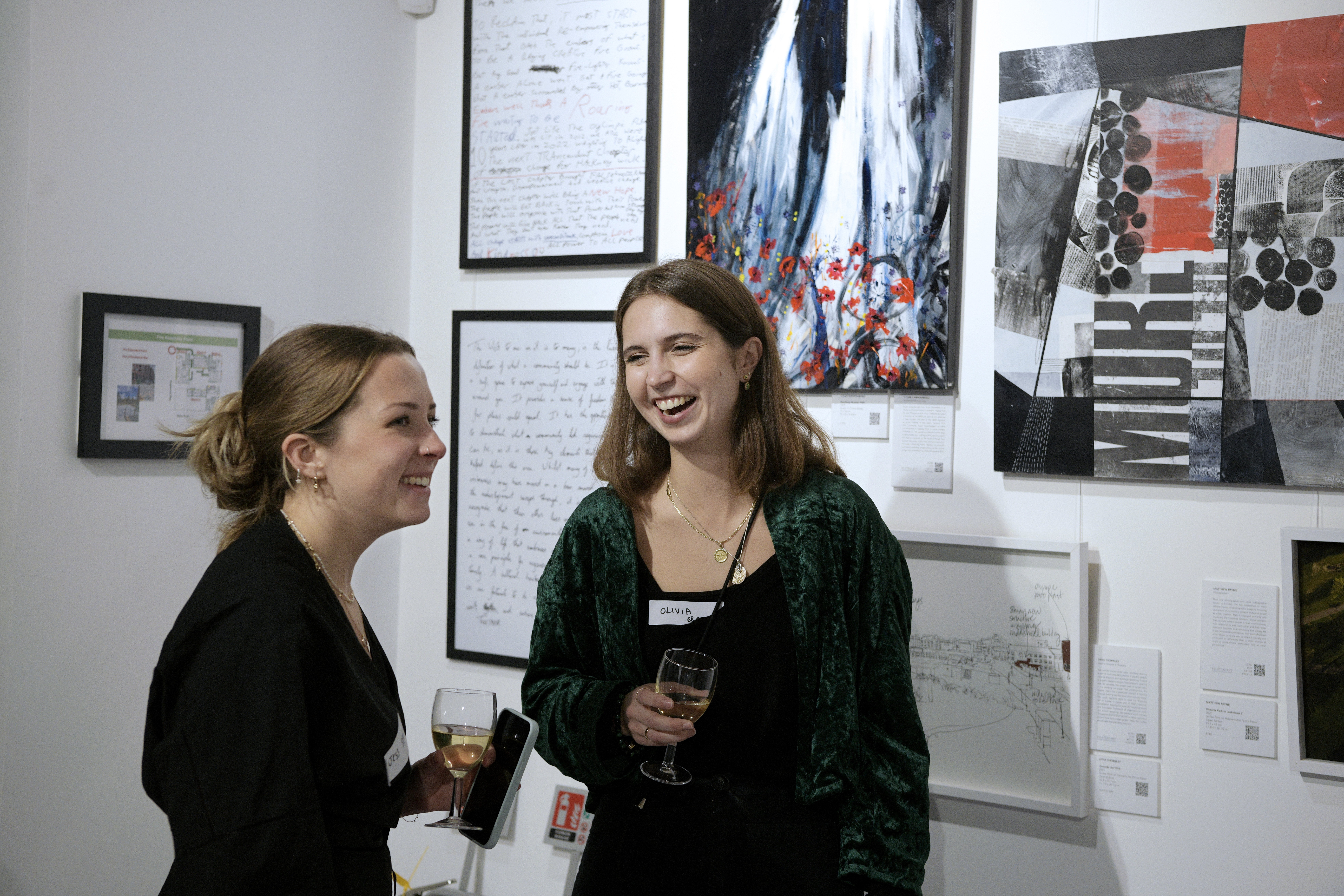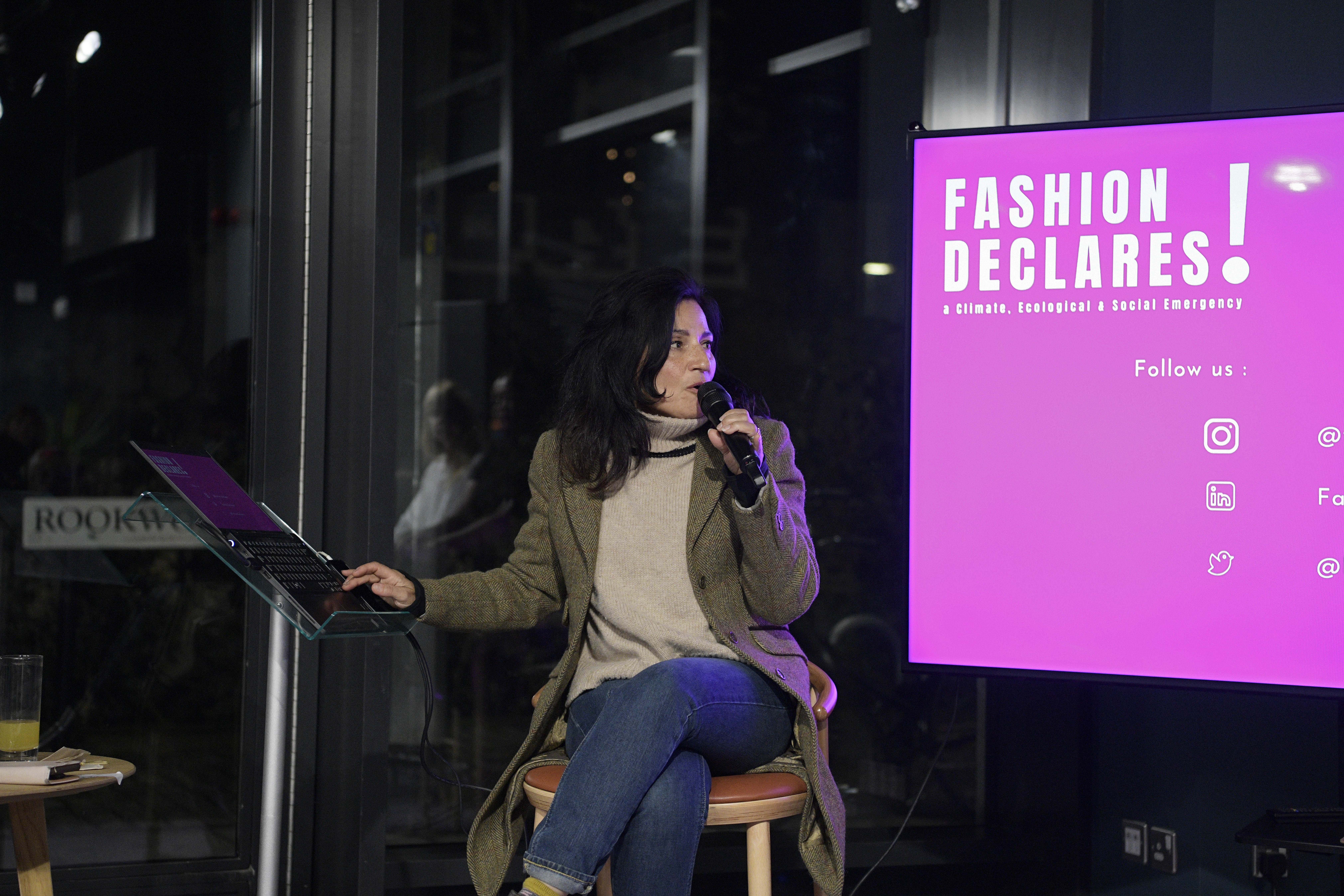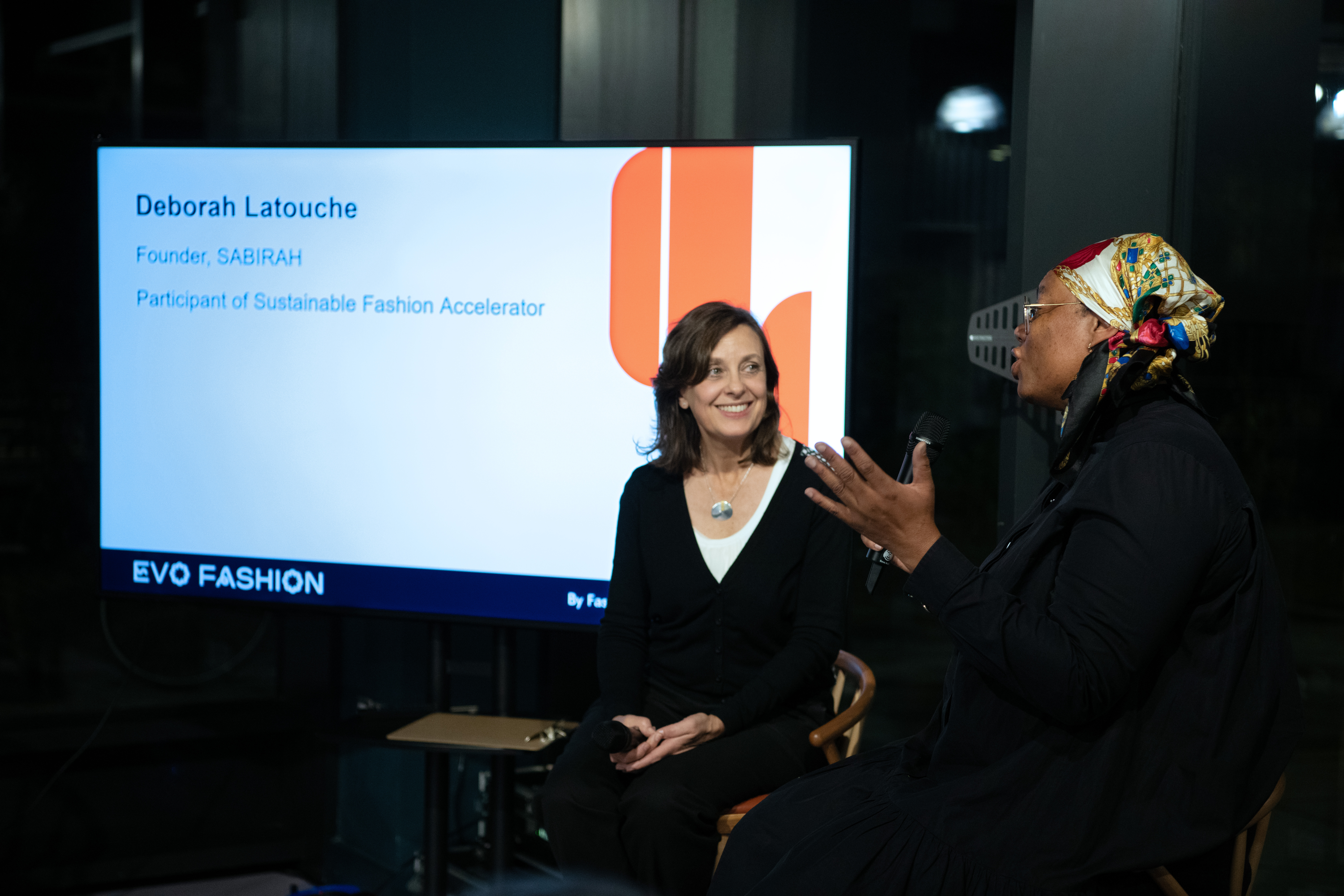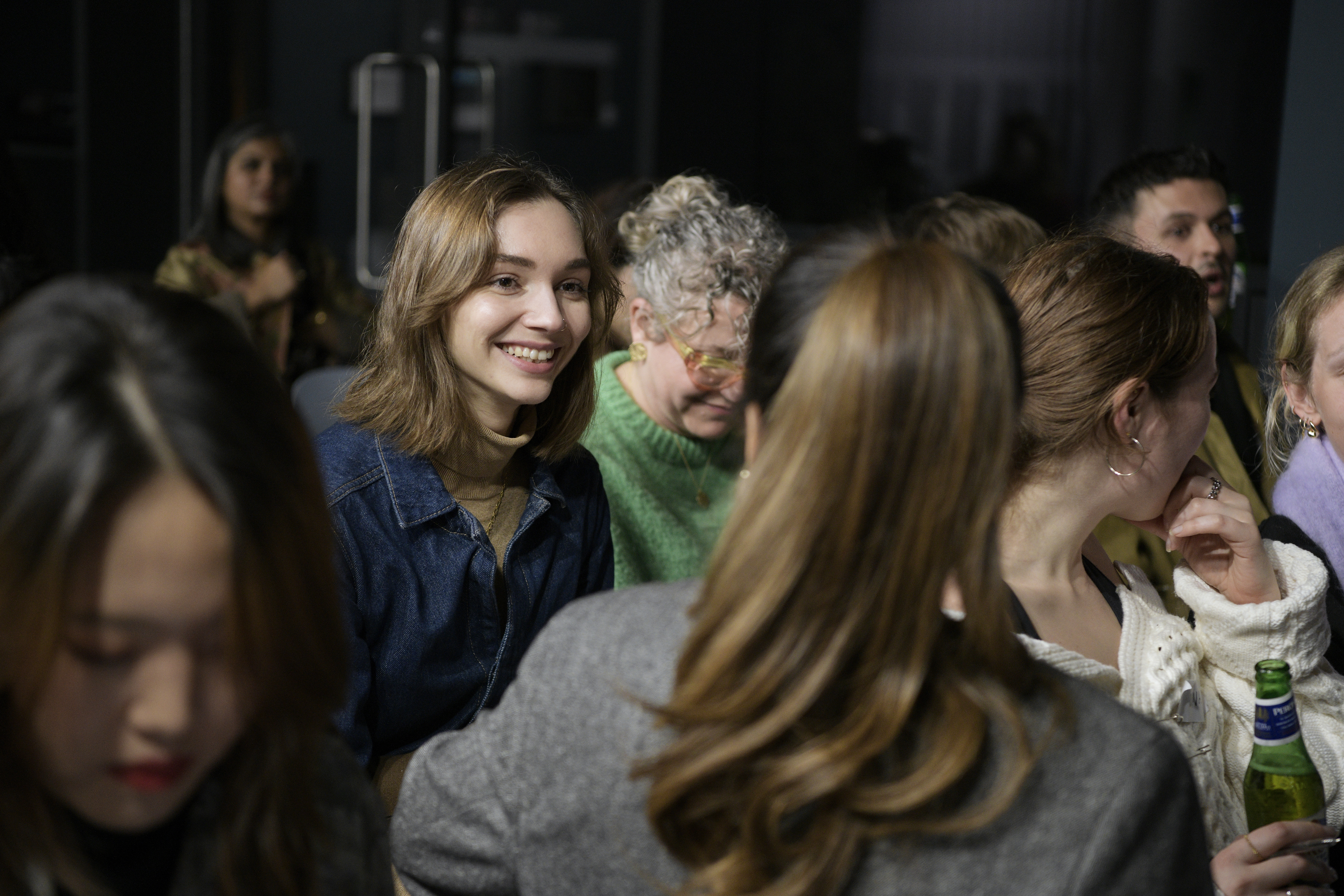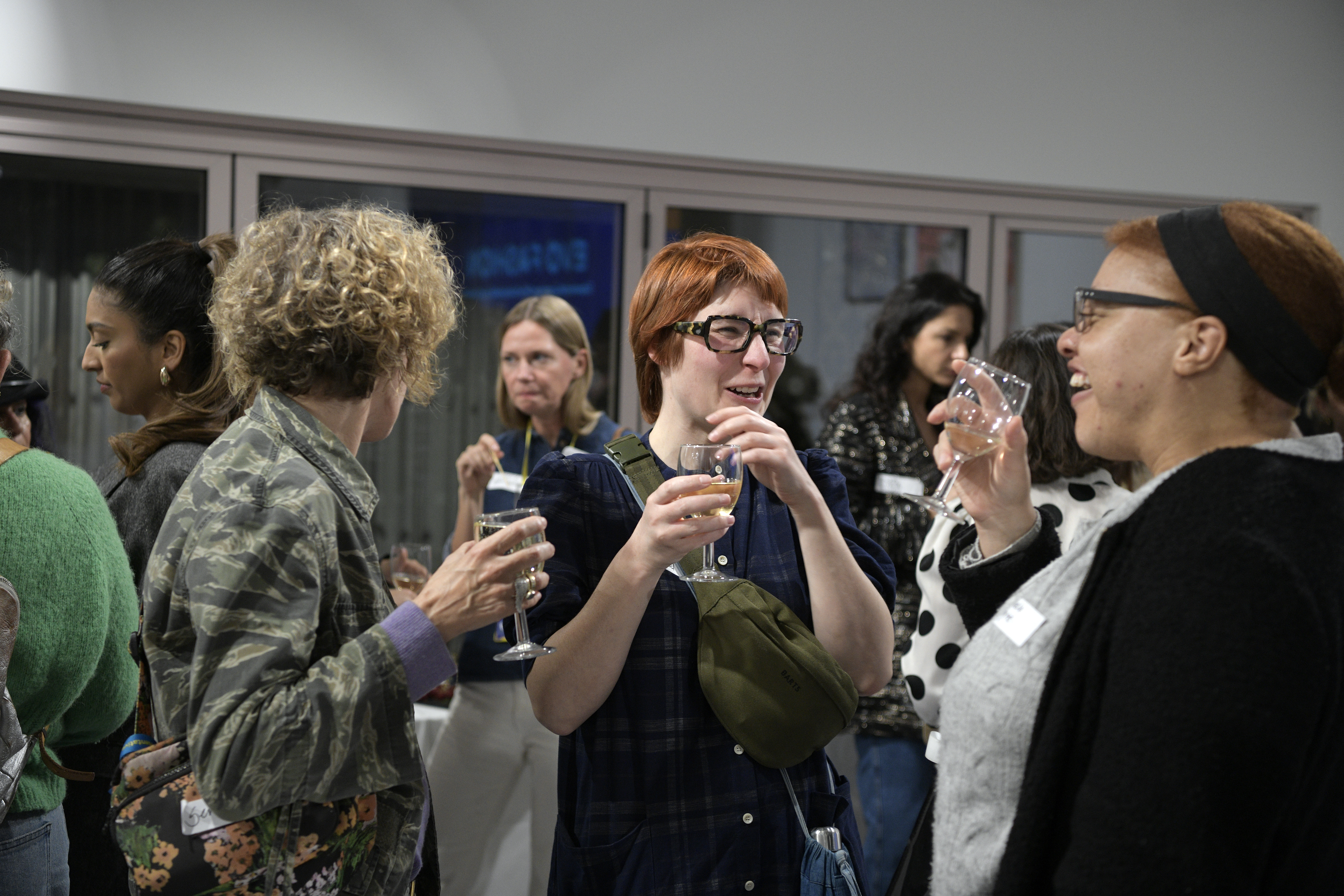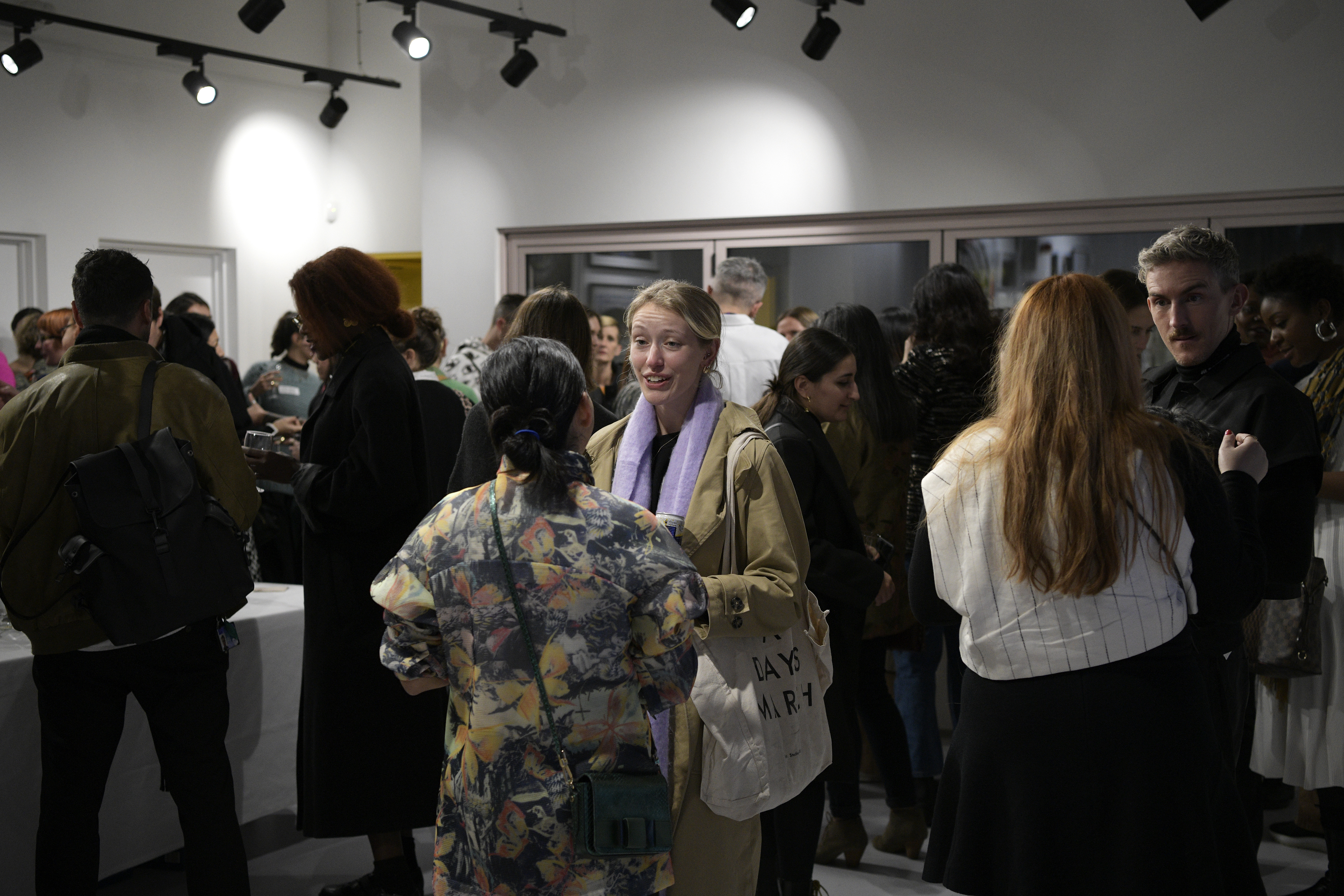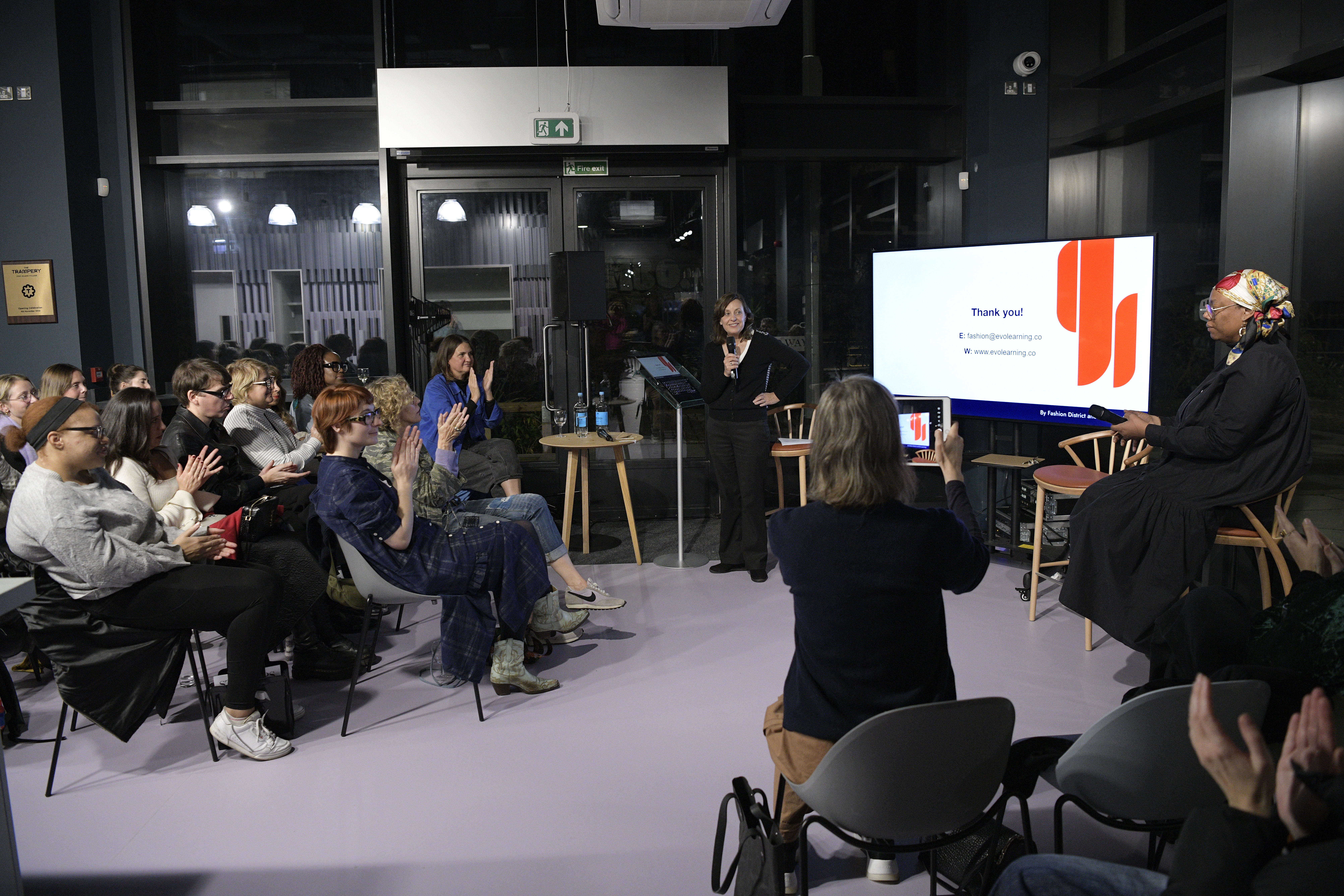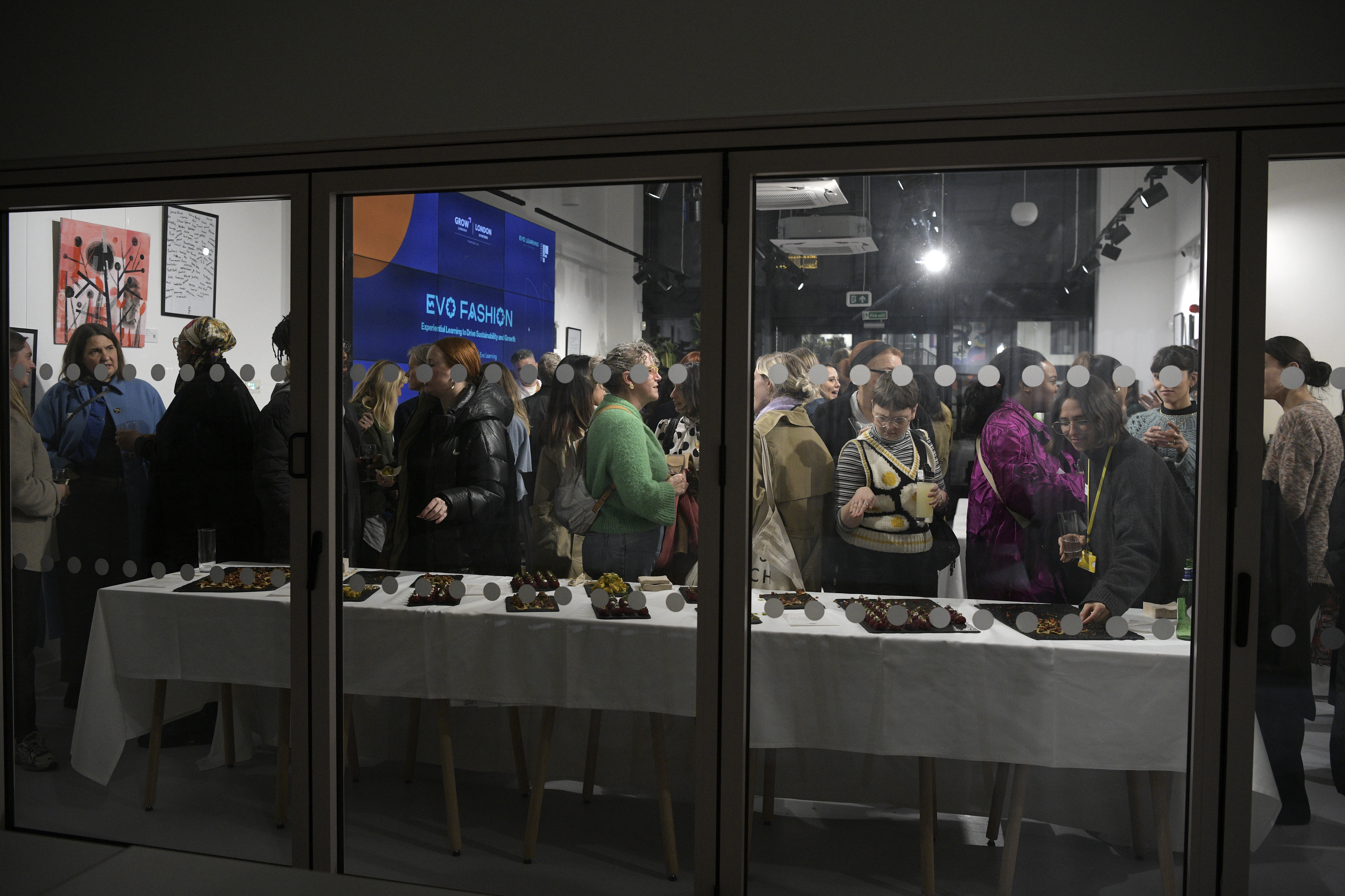No Ordinary Cloth x Fashion District: An interview with Mili Tharakan
Mili Tharakan is a woman of many talents. Having spent 20 years working in smart textiles as a designer and researcher, Mili brings her expertise to her podcast No Ordinary Cloth, where she delves into the wonderful world of textiles and tapestry innovation. Recently, Fashion District collaborated with No Ordinary Cloth on a podcast mini-series, featuring interviews with some of the most innovative emerging designers, pioneers, experts, and visionaries in the sustainable textiles space.
Last week, we had the pleasure of speaking with Mili about her career journey, the inspiration behind her hit podcast, and the resources she recommends for those interested in the field. Read on to discover more.
Tell us a bit about your background.
I’m a smart textile designer and developer with 20 years of experience in academia and industry. My passion lies at the intersection of traditional textile crafts and emerging technology, inspired by my Indian heritage and its vibrant textile culture.
Over the years, having lived and worked in countries including Oman, Singapore, Sweden, and now the UK, I love learning about new cultures, their heritage crafts and textile narratives found in their social, political, economic and religious contexts.
I love to travel and I’m currently learning Spanish, hoping to discover South American textile crafts. Above all, I value relationships and enjoy meeting new people, often saying that while some collect board games or art, I collect friends.
What inspired you to start the podcast?
I started the podcast during a period of reflection after 20 years in smart textiles and wondering what I wanted to do for the next 20 years. Having participated in the development of smart textiles from its early days and navigated the often solitary and challenging path of innovation, what I wish I had during this time was a community of others who were on similar journeys, to learn from each other, to help each other.
This was the little spark that motivated me to create a community that brought together innovators who were radically changing the textile industry landscape, to share our experiences and learnings, to inspire and support each other. I wanted to tell the stories of others who are navigating this uncharted path and share their insights.
I felt it was important to democratise this knowledge, making it accessible to a broader audience and showcasing the incredible possibilities within textiles while changing the very way we imagine, make, use and dispose of textiles.
What impact do you hope the podcast will have, and what types of audiences are you aiming to connect with and why?
When I graduated with a textile degree in the summer of 2001, I stumbled upon the book Techno Textiles in a bookstore, and it completely turned my world upside down. I learned about integrating light into fabrics and using textiles as sensors, and I was instantly hooked. That book set me on an incredible 20-year adventure, transforming my career and ideas about the meaning, role, and function of textiles in ways I never imagined. I hope this podcast will spark curiosity, inspire and inform a diverse audience, and transform someone’s career as the book did for me.
My aim is to:
- Provide textile practitioners with a bird’s-eye view of our evolving industry, encouraging cross-disciplinary collaborations.
- Share stories that demonstrate how others have carved unique paths in the industry.
- Bring niche textile innovation discussions and knowledge to a wider audience.
- Showcase the intersection of science and creativity in textiles, inspiring young people to see the relevance of science in design fields.
- Connect startups and innovators, fostering a supportive community.
Ultimately, I want to build a community that supports each other and pushes the boundaries of textile innovation, reaching audiences from curious teenagers to industry professionals and startups.
What excites you most about textile innovation at the moment? Are there any particular innovators or trends in the industry that you are especially enthusiastic about?
I’m very excited about next-gen materials, but recently, I’ve become equally fascinated by the often-overlooked innovations in manufacturing processes, particularly in weaving. This might be because I love weaving. The 3D weaving technologies developed by companies like Unspun and Weffan, and the Digital Jacquard Handloom by Digital Weaving Norway, are truly revolutionary. I can’t wait to see how these areas evolve!
I am also curious about innovative recycling solutions, especially for blended fabrics and nylons. The CEO of Syntetica said, “We already have enough textiles in the world to make all the garments we need”. This is a powerful statement. Maybe we don’t need to create new textile materials but can maximise existing materials – this is an area I am following closely.
How do you see the future of textile innovation evolving over the next 5-10 years?
Using the Gartner Hype Cycle as a reference to answer this question, I believe we’re currently between the Innovation Trigger and Peak of Inflated Expectations stages. There is lots of interesting proof of concept, the media is all over it, we are all excited about the developments and the promises it makes. But in some areas like next-gen materials maybe we are already moving into the Trough of Disillusionment. In 5 years, I think we’ll likely reach the Slope of Enlightenment, and in 10 years, the Plateau of Productivity with mainstream adoption of some of these technologies.
Education in textiles and fashion will need to evolve radically to enable the evolution of these innovations. We must train people for future jobs, teaching fashion students to design for 3D weaving garments or equipping textile designers to work with biochemists to create new dyes. There needs to be a complete rethink about the skills we need in the next 5-10 years to drive textile innovations and impact the industry. Students need to be able to move more fluidly across disciplines.
Key areas of development include:
- Maturation of new and next-gen materials in the supply chain
- Innovation in manufacturing processes
- Enhanced customisation and on-demand services where things are made once someone buys it, rather than the mass production model we have today.
Overall, it’s such an exciting time, and the industry will likely look radically different in 10 years.
For those interested in learning more about textile and fashion innovation, could you recommend any books, articles, documentaries or other resources on the topic?
- Techno Textiles and Techno Textiles 2 by Sarah E. Braddock and Marie O’Mahony. I would still highly recommend these books that inspired me 20 years ago. I believe it is still very relevant. It’s really fascinating to trace back some of the work you see today to its origin or starting point in these books and it still opens up some many possibilities
- Textile Visionaries: Innovation and Sustainability in Textile Design by Bradley Quinn
- Radical Matter: Rethinking Materials for a Sustainable Future by Kate Franklin and Caroline Till
- Unfolding Fashion Tech: Pioneers of Bright Futures by Marie Toeters et al
- Textile Innovation Podcast
- Abstract: The Art of Design (Netflix series about Design in general)
- Future Fabrics Expo by Sustainable Angle in London and New York
Staying true to her ethos, that ‘textiles matter,’ Mili’s belief that every fibre, every stitch, and every innovation can have an impact on our lives and the environment resonates deeply in today’s fashion climate. Curious to learn more? Tune in to the first two episodes of our exclusive mini-series with Mili here: https://open.spotify.com/show/1L4KAxUefaynGoVi1x0cns?si=2b84ea5055094413
You can also follow the podcast on instagram at @noordinarycloth.
Keep up with our latest events and opportunities by following us on Instagram and LinkedIn:
- Instagram: @fd_ldn
- LinkedIn: Fashion District – London
Come to the launch of our new Innovation Challenge: Manufacturing Futures 2024
Thursday 8 Feb | 18:00 – 20:30
The Ballroom, The Trampery, 239 Old Street, London, EC1V 9EY
We’re delighted to announce the launch of our next innovation challenge Manufacturing Futures 2024, hosted in partnership with The Trampery, a purpose-led enterprise providing workspace, training and management for London’s trailblazing businesses. Join us on 8th February to find out more about next year’s challenge, hear from leading figures in fashion sustainability, and network with London’s fashion, tech and innovation communities.
To help us launch the challenge, we’ll be hearing from Lauren Bartley, Chief Sustainability Officer at GANNI and Jen Keane, CEO of Modern Synthesis, one of our Manufacturing Futures 2021 winners. Lauren will present a keynote on embedding innovative sustainable solutions into a large brand, followed by a discussion with Jen about how the GANNI x Modern Synthesis partnership came about.
Afterwards, we’ll launch next year’s challenge brief, followed by a ‘meet the judges’ panel, where attendees will get the opportunity to learn more about our judges and find out their criteria for selecting the winners. The evening will conclude with networking, drinks and nibbles.
Agenda:
- 6:00pm – Drinks and canapés
- 6:30pm – Welcome and intro by Helen Lax, Director of Fashion District
- 6:35pm – Keynote speech with Lauren Bartley (GANNI) and Jen Keane (Modern Synthesis)
- 7:05pm – Introduction to Manufacturing Futures 2024
- 7:20pm – Meet the Judges
- 7:35pm – Q&A
- 7:45pm – Wrap up and close
- 7:50pm – Networking and drinks
About The Challenge
Fashion District’s annual Innovation Challenges are designed to find solutions to current industry issues, while supporting new innovations and SMEs. Next year, we’re running our second ‘Manufacturing Futures’ challenge, to support technological innovations and sustainable solutions which are solving any of the complex fashion manufacturing challenges facing the industry. This could include anything from:
- Materials innovation
- Digital innovation
- Manufacturing processes
- Waste management
- Supply-chain and logistics
- Transparency and traceability
- Circular economy
- End-of-use
We also seek to encourage tech solutions, perhaps from other sectors, that could be applied to fashion manufacturing and create interdisciplinary connections between technologists and engineers, and fashion creatives and manufacturers.
Applicants will be in with the chance of winning cash prizes, business support, and the opportunity to pitch to some of the industry’s leading brands and innovators.
MEET OUR JUDGES
Manufacturing Futures 2024 brings together high-profile fashion, technology and sustainability experts committed to supporting the next wave of innovation. Come along to the launch to hear from our esteemed judging panel, including:
- UKFT (Adam Mansell, CEO)
- Selfridges (Ella Gould, Head of Sustainability and Innovation)
- Alexander McQueen (Gillian Lipton, Sustainability Director)
- Fashion Innovation Agency (Matthew Drinkwater, Head of FIA at UAL: London College of Fashion)
- PANGAIA (Chelsea Franklin, Head of Advanced Concept Design)
Follow us on Instagram, LinkedIn, Facebook and Twitter to receive updates about this exciting event!
- Instagram: @fd_ldn
- Facebook: Fashion District London
- LinkedIn: Fashion District – London
- Twitter: @fd_ldn

Evo Fashion Launch at The Trampery, Fish Island Village
Last week we launched Evo Fashion, our free five-month business support programme that will be running throughout 2024.
Taking place at The Trampery Fish Island Village, the event offered attendees the chance to hear from industry experts, learn more about the Evo Fashion programme and network with London’s sustainable fashion community over drinks and delicious canapés from Palm Greens.
Speaking to the crowd, Helen Lax, Director of Fashion District, said ‘We are looking forward to the next evolution of fashion and the power of fashion designers and fashion technology businesses who are thinking about embedding sustainability into all of their business practices.’
The programme, which is part of the Grow London Early Stage programme by London & Partners, and funded by the UK Shared Prosperity Fund, is designed to help early stage fashion businesses drive growth and integrate sustainability into every aspect of their businesses.
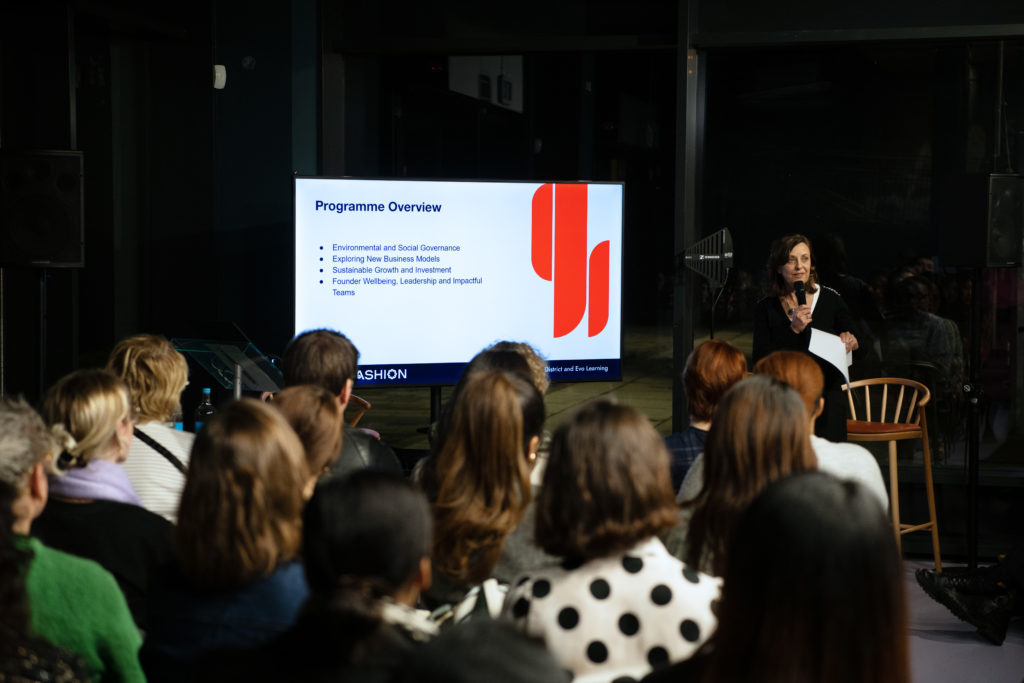
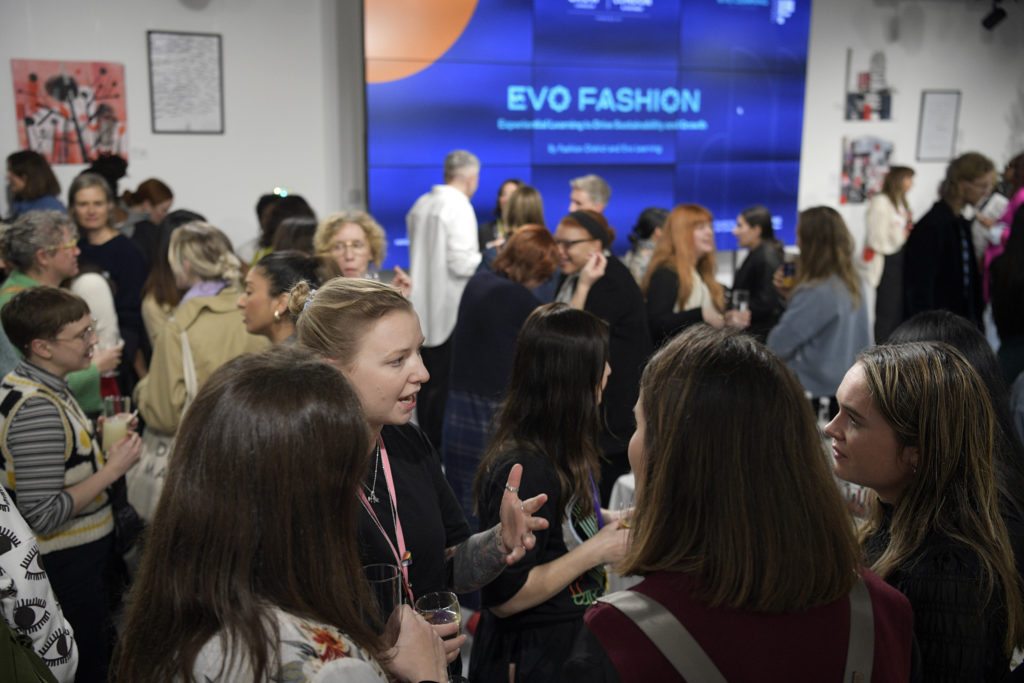
Image credit: Christian Sinibaldi
Evo Fashion in Action
Kicking off the event, Safia Minney, Founder of Fashion Declares, took to the stage with Debbie Luffman, Director of Think Circular, and Ngoni Chikwenengere, Founder of We Are KIN, for the ‘Evo Fashion in Action’ conversation.
Giving context to the need for sustainable innovations, Safia spoke about fashion’s impact on climate ecosystems. ‘We all know that overconsumption is driving a desperate situation. Currently, five percent of greenhouse gas emissions are said to be produced by the fashion and textile industry. That’s set to increase to twenty-five percent by 2050. We can’t let that happen. Fashion needs to move now.’
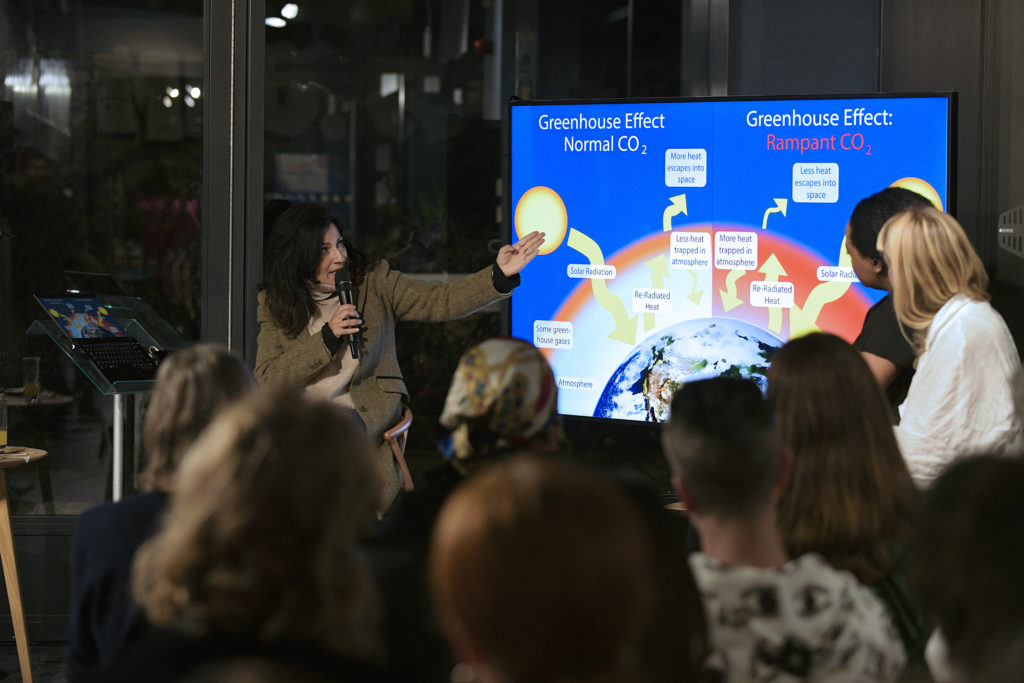
Talking about the ethical and sustainable practices she uses in her clothing brand, We Are KIN, Ngoni Chikwenengere told the audience, ‘One of the first things I wrote down when writing my business plan was my mission statement: ‘people and planet over profit.’ That’s my ethos and it’s what the entire brand is built on.’ Since launching five years ago, Ngoni is still staying true to her brand’s message with all of her clothes being manufactured in East London. ‘I want to know exactly what’s going on so I often drop by the factory because I want to see the conditions people are working in. The people who work there are paid a living wage, they look happy and the environment is clean. In terms of the fabrics, the cotton, linen, and wool are all sourced in the UK. We also use deadstock fabrics.’
When asked for her tips on securing deadstock fabric, Ngoni said, ‘If you don’t ask, you don’t get. It’s important to talk to people and ask lots of questions.’
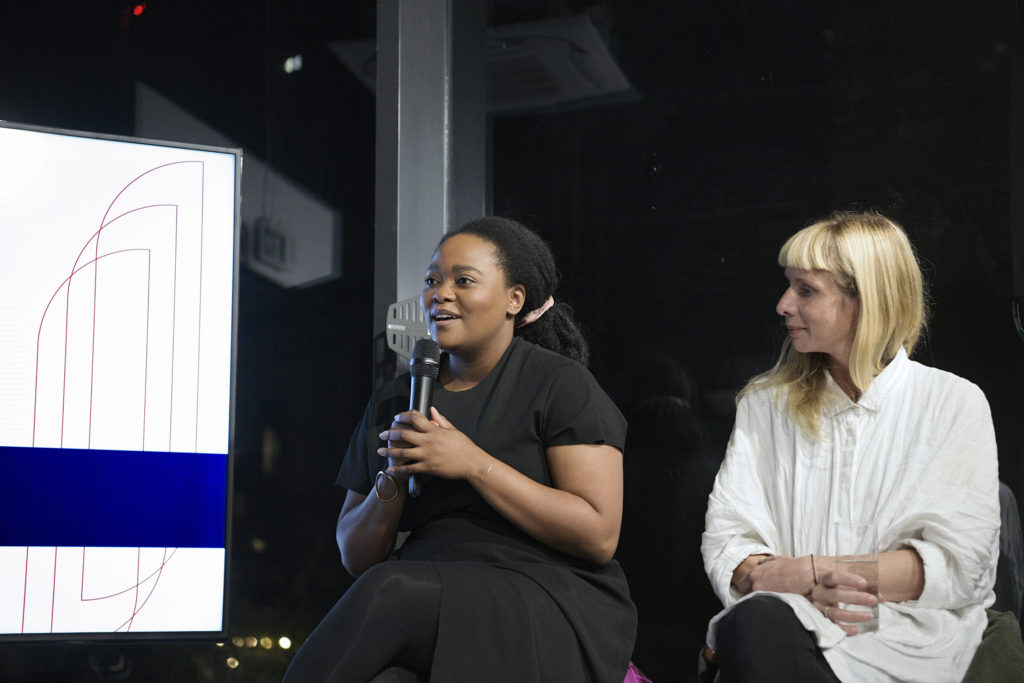
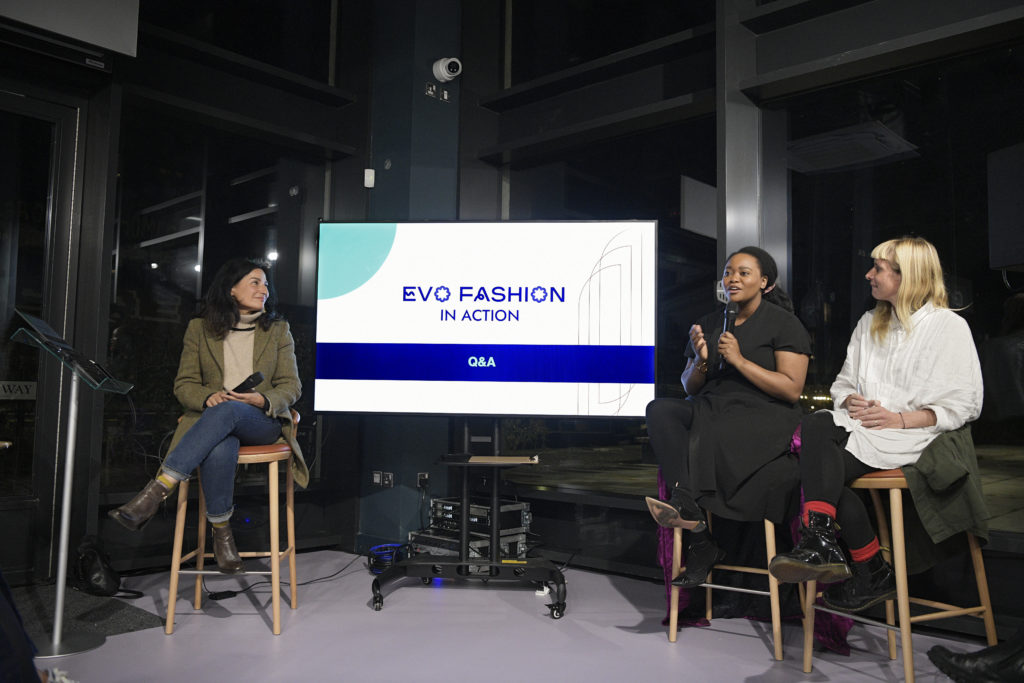
Debbie Luffman, Director of Think Circular, echoed the same sentiment. ‘To become fully sustainable as a brand you have to ask questions and refuse to settle for anything less.’
‘Change in our industry needs to be louder, because the larger organisations are listening – they really are well aware of the issues – but it can be harder for them to change. That’s why I say don’t rush to be a professional outfit too soon. This is your moment to get things right from the beginning stages of your brand and think about embedding sustainability into every aspect of your business, which many big brands are struggling with now.’
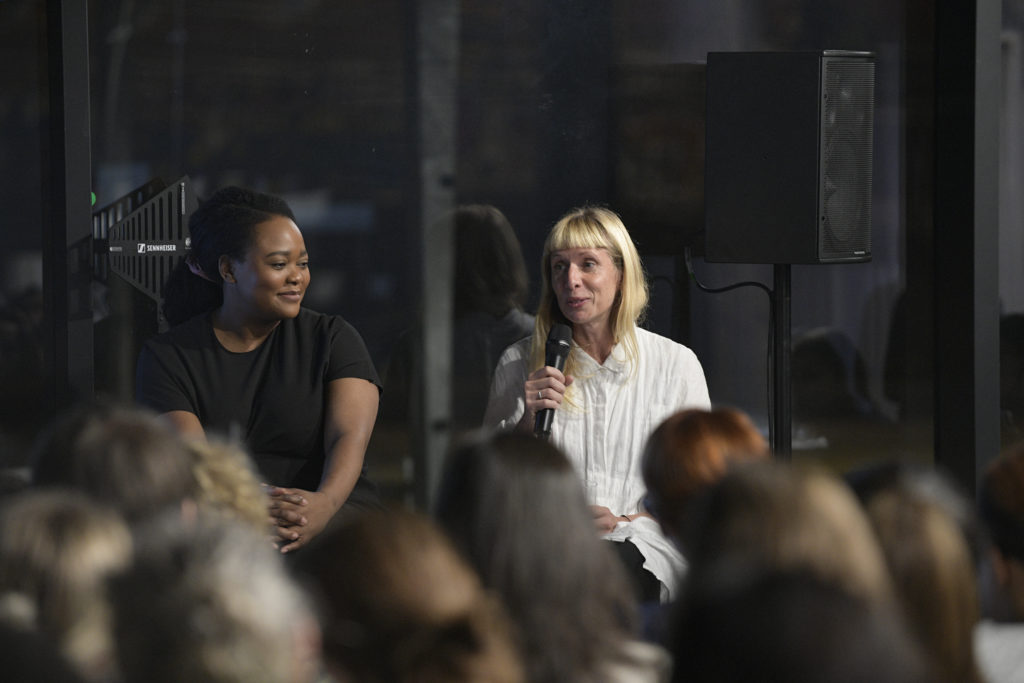
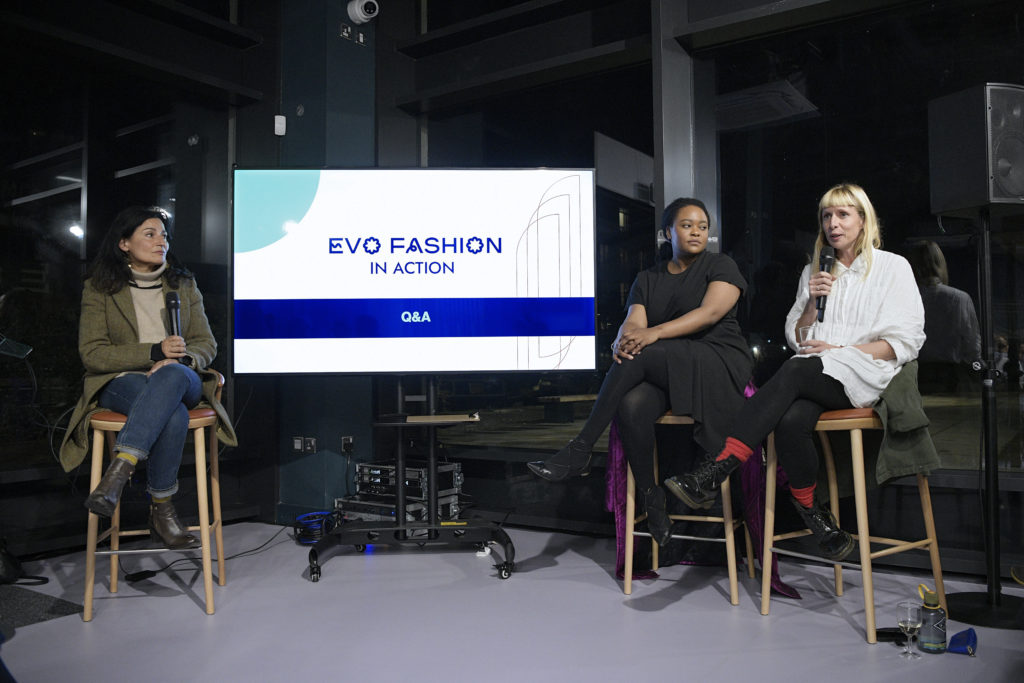
Afterwards the floor opened to questions, with one audience member asking whether consumers were ready for change. ‘Consumers are definitely ready,’ Ngoni said. ‘Shoppers love being at the forefront of innovation. If someone is offering you something new, shiny and sustainable or the same old thing, we all know we would choose the first option. Last November, I sold 800 units in one month, all made to order. The demand is there.’
Debbie said, ‘I think you have to think about the way you make your customer feel. I’m not sure if they care about fabric if I’m really honest with you, but how does it make them feel? Your job is storytelling. Tell the story. Where did it come from? What’s the provenance? What’s it going to do for them? That’s the narrative.’
Another audience member asked whether the panel thought there was competition between small sustainable fashion brands which creates contradiction when setting out to build a better planet. ‘If you share the same value models then you shouldn’t be in competition,’ Debbie answered. ‘In my opinion, IP doesn’t make sense anymore. We should have open source material that’s shared and serves each other. Different brand identities is the creative difference. I think we need to unpack the word ‘sustainable’ and have that open source collaborative mentality to break down those boundaries. You need to build opportunities where you both win.’
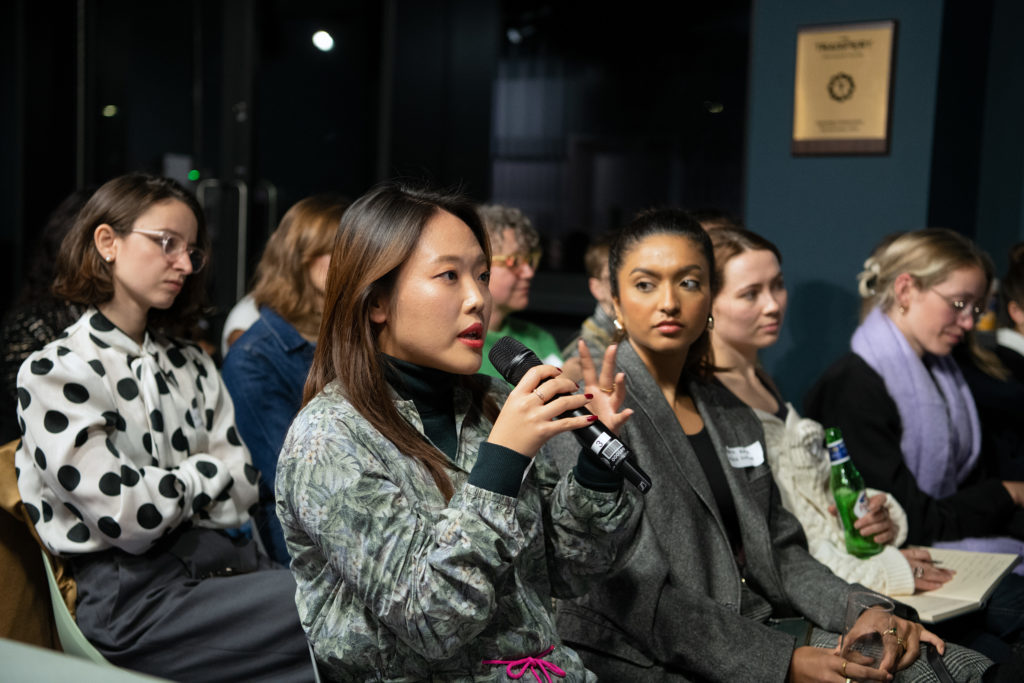
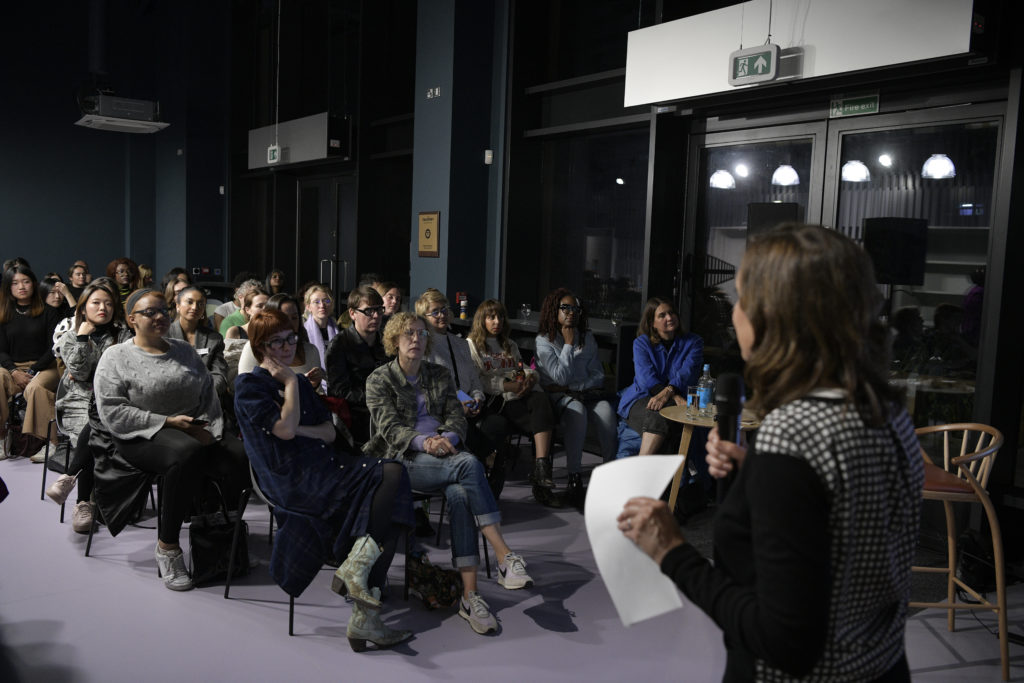
Introduction to Evo Fashion
Next up, Helen Lax took to the stage to present a comprehensive overview of the Evo Fashion programme. ‘There will be two programmes running throughout the year,’ explained Helen, ‘the first for fashion designers and the second for fashion technology businesses. Both are tailored to support innovation across the different subsectors of fashion.’
Designed to fit in with work commitments and delivered by experts, the programme will consist of a two-day intensive launchpad and four full-day masterclasses which will focus on different aspects of learning, including environmental and social governance, exploring new business models, production and innovation, sustainable growth and investment, finance and business planning, and founder wellbeing, leadership and impactful teams. Peppered in amongst the sessions and masterclasses, there will also be panels and talks, a 1-2-1 business diagnostic, three peer-to-peer learning workshops, a creative photoshoot, and the chance to present your brand at Fashion District’s Manufacturing Futures 2024 Industry Showcase to a room full of investors, brands, startups and innovators.
‘In terms of eligibility, you must be a registered business based in London. You must employ 2-5 people and you must have been trading for 18 months,’ said Helen. ‘We have to be able to tell from the application that you want to grow. By this I mean, growing to the scale that you want to grow to in the way that you want to grow. We want to see that you’ve got the ambition to make your business work and succeed sustainably and financially.’
With an incredible selection panel for the first cohort, including Vanessa Podmore, Founder of Podmore Consulting; Yvie Hutton, Director of Design Relations and Membership at the British Fashion Council; Charles Armstrong, CEO of The Trampery, and Helen Lax, Director of Fashion District, applications opened last Wednesday and will close at midnight on 18th January 2024.
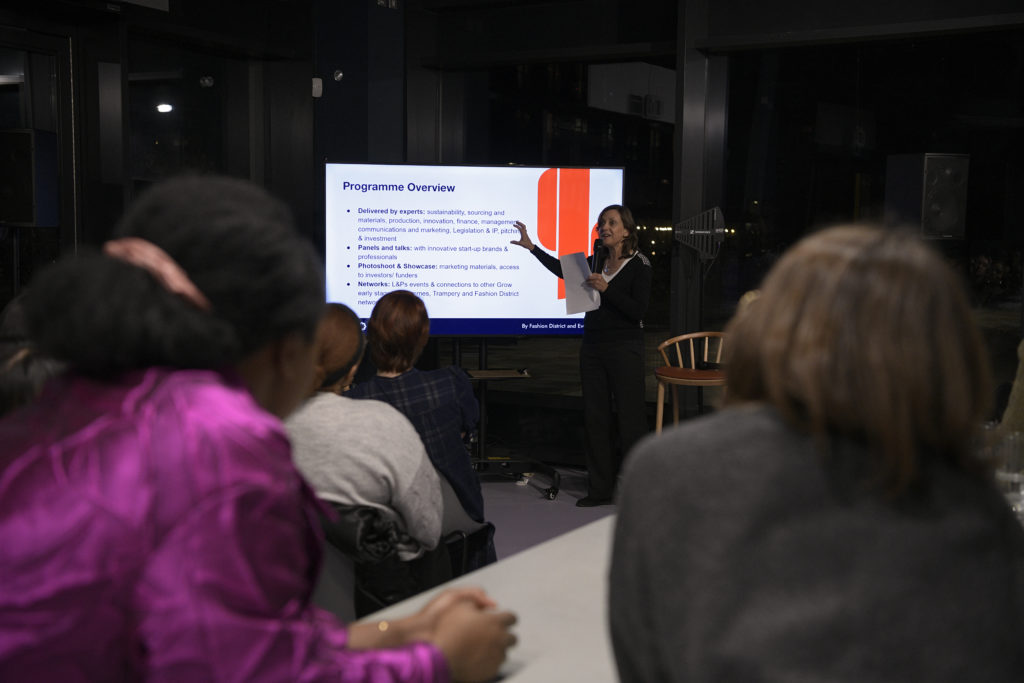
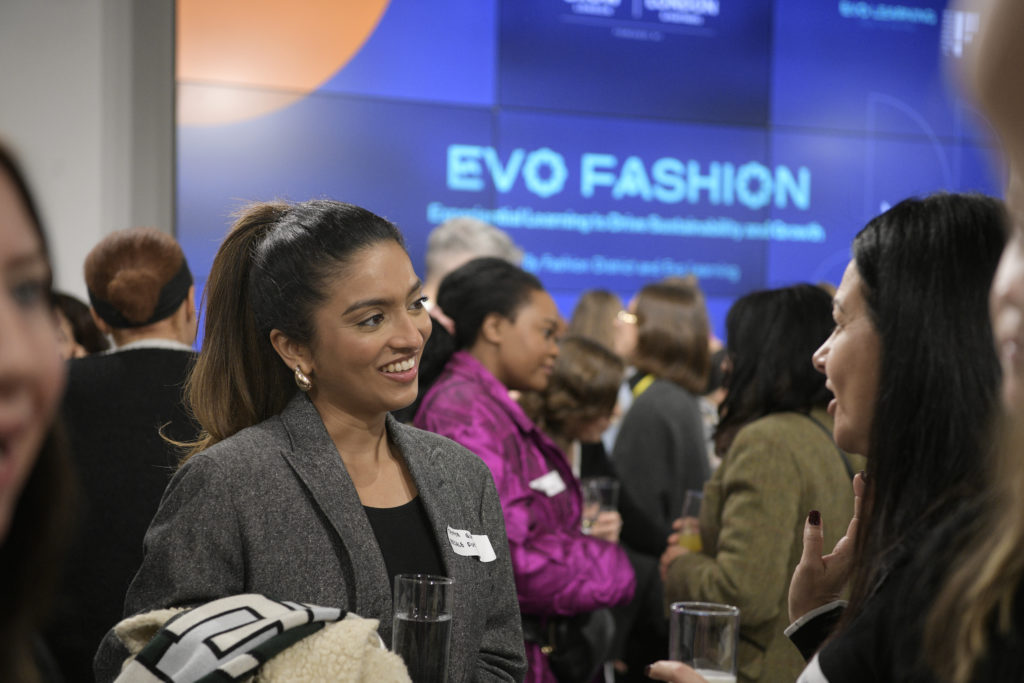
Closing the event, Deborah Latouche, founder of luxury modest wear brand SABIRAH, joined Helen on stage to discuss her experience of our previous sustainable accelerator programme. ‘Despite being held during the pandemic, the programme was really great,’ said Deborah. ‘It solidified for me a lot of the things I was already thinking about. I had always questioned the wholesale model, and so after doing the course I knew it was right for my brand to continue being demi-couture – made to order, made to measure. The fabrics are also all predominately end of life too.’
Speaking about her experience with Vanessa Podmore, who will be one of the Evo Fashion mentors next year, Deborah said, ‘My 1-2-1 masterclass with Vanessa was mind-blowing. She has a world of knowledge and I definitely think the course is well worth applying for.’
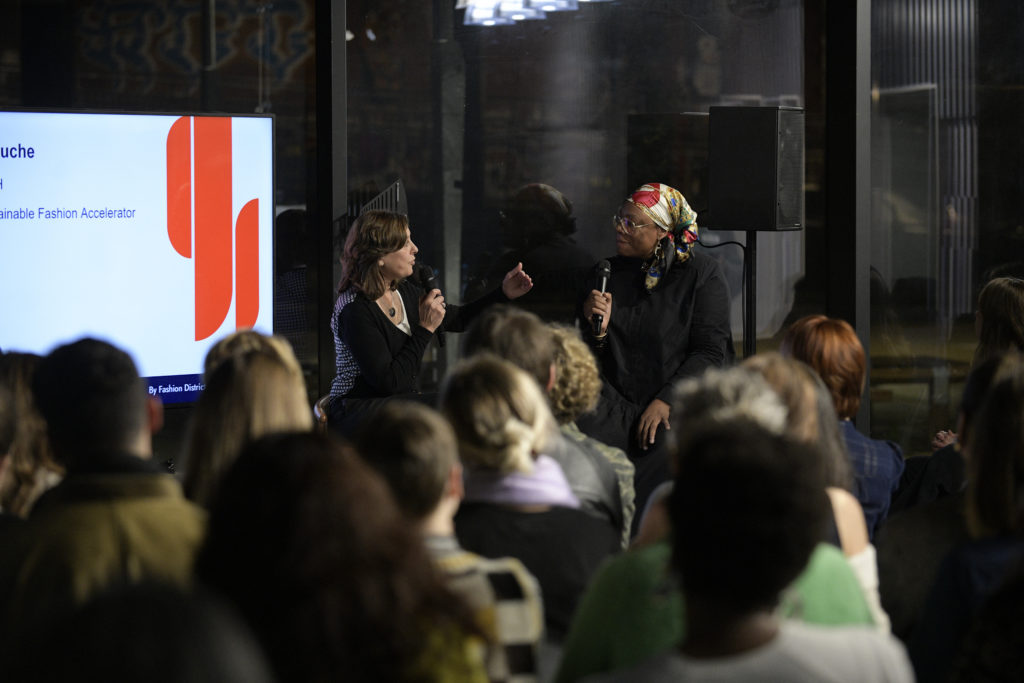
Are you ready to take your business to the next level? Applications for Evo Fashion are now open!
Follow us on Instagram, LinkedIn, Facebook and Twitter to keep up with future events and announcements!
- Instagram: @fd_ldn
- LinkedIn: Fashion District – London
- Facebook: Fashion District London
- Twitter: @fd_ldn
All images by Christian Sinibaldi
Fashion District Festival: Live Showcase – Watch Now!
The Fashion District Festival kicked off in true style with an extraordinary showcase that illuminated East London’s emerging creative talent. Elevating the traditional catwalk experience with physical and digital runways, the showcase also featured interviews with participating designers and creators about the future of the fashion industry. Scroll down to watch the full live broadcast below.
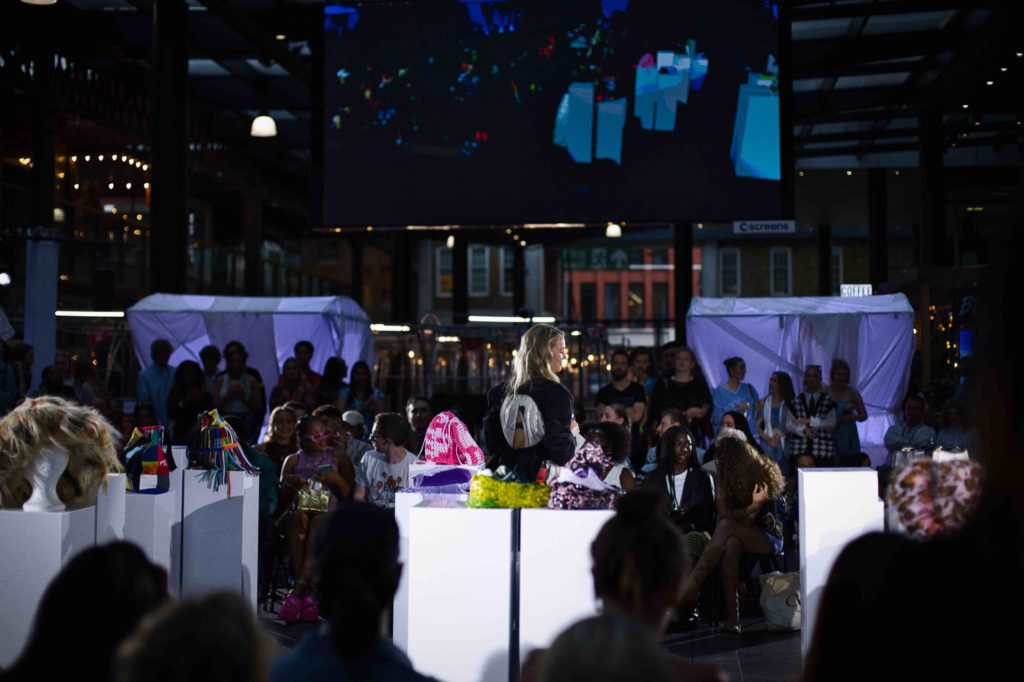
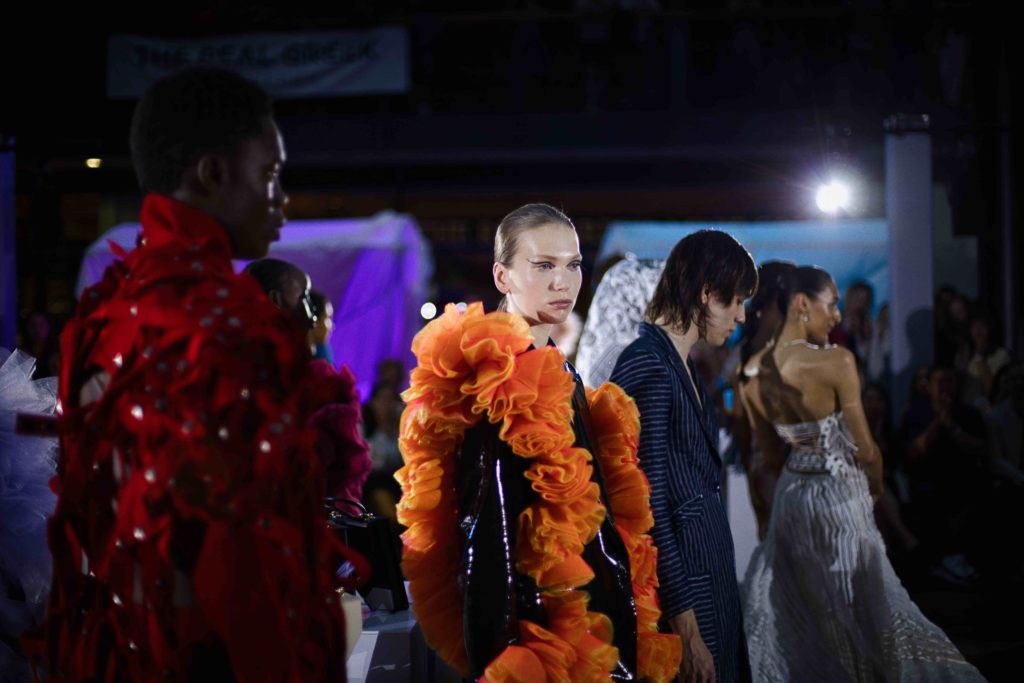
@papi_oyp
Hosted by the fabulous Gemma Care, styled by George Oxby and Angus Cockram from AGRO Studio, and featuring Tanya Tan from Flair Fashion and Joy Craig from Alterist (who were featured in our Festival Pop-Up Shop), the iconic Spitalfields Market set the stage for an unforgettable display of artistry.
Curated by AGRO Studio and Lee Lapthorne from ON/OFF, the show featured London’s most promising emerging designers, showcasing their upcycled, recycled, and sustainable creations.
Lee Lapthorne said, “The ambition of the show is to really support East London talent. We’ve done that by creating a showcase that brings together the true creativity of East London… with a vision of upcycling, recycling, and sustainability. That’s what the industry is driving towards – supporting the planet and the talent that’s here.”
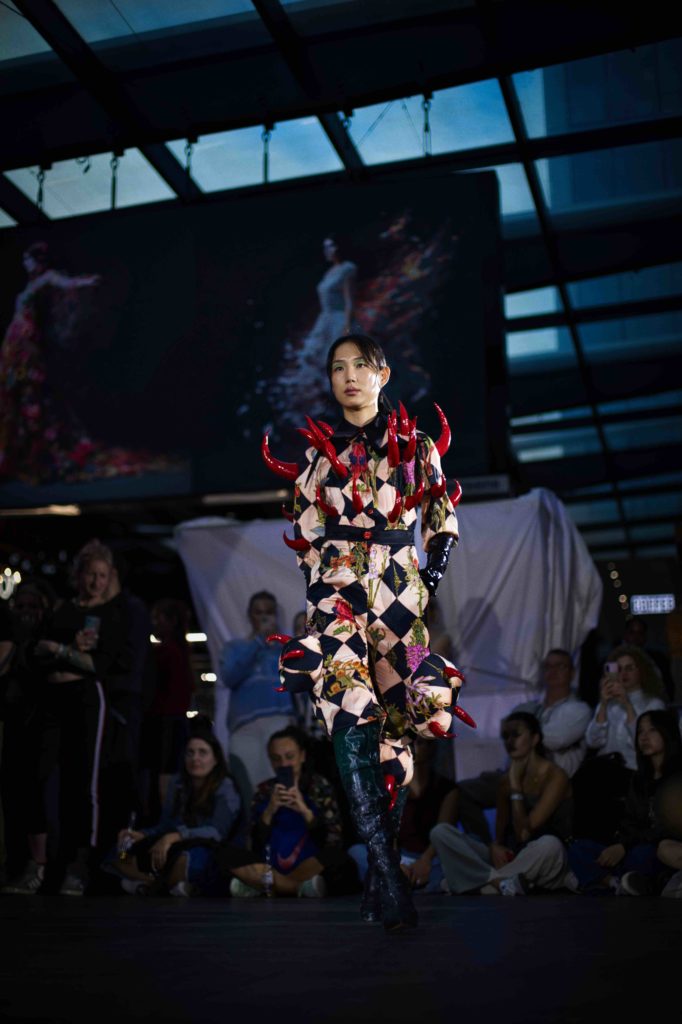
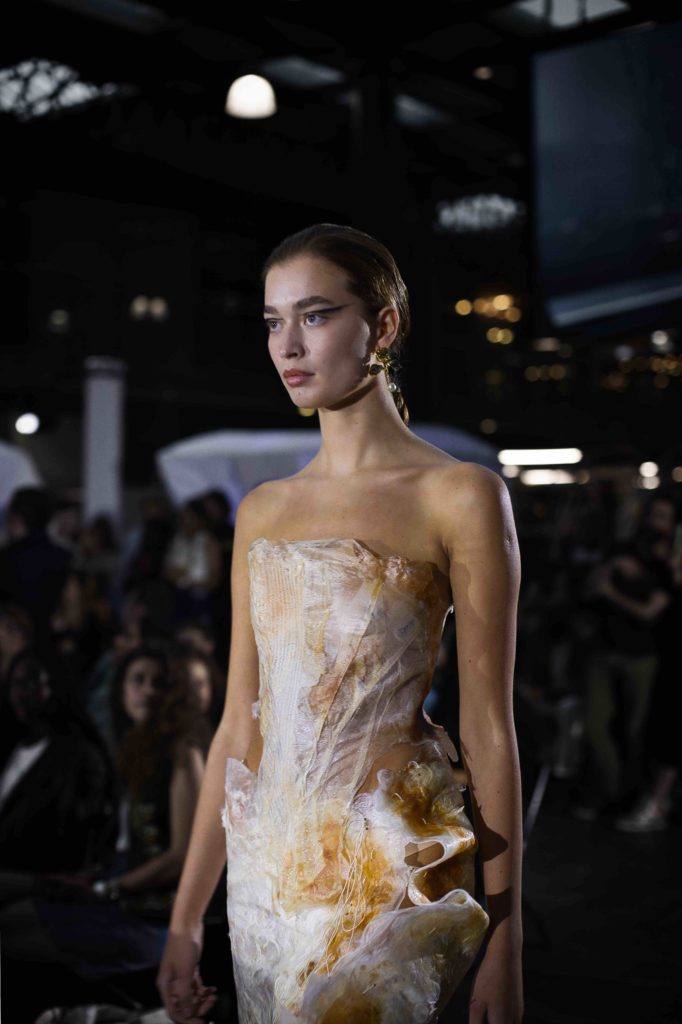
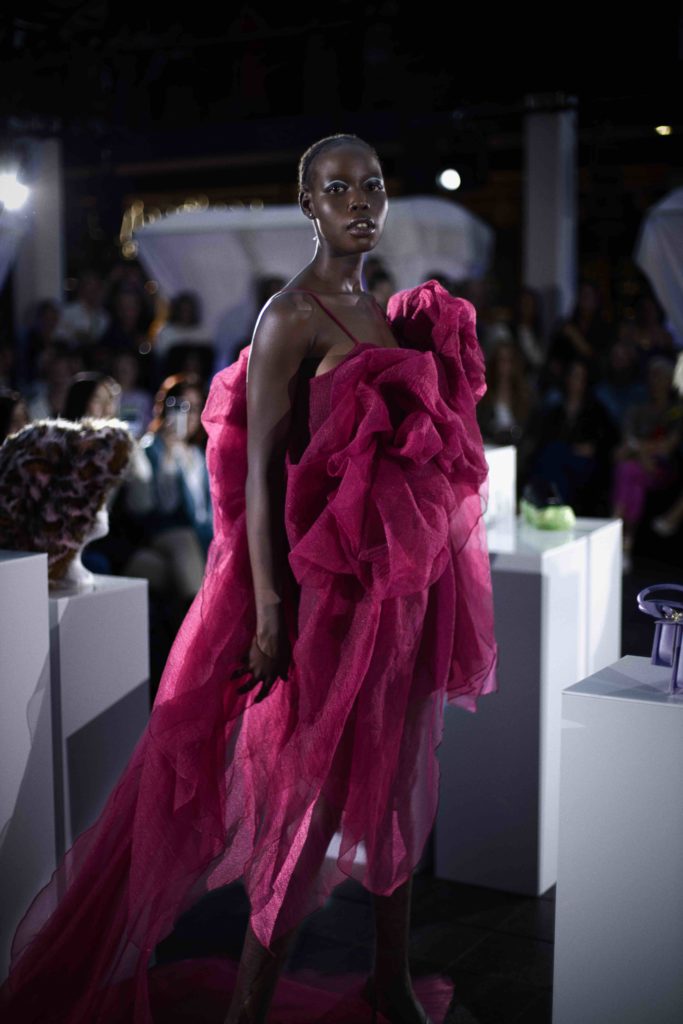
@papi_oyp
Not stopping there, the event also celebrated visionary designers from the rapidly developing digital fashion space. Filmmaker Oscar Keene curated a digital runway, presenting stunning garments from emerging digital designers.
Janey Park, the brilliant brand strategist and content creator, shared her insight into the future of fashion, emphasising collaboration, co-creation, and community. “It’s just fashion at the end of the day. It’s going to be the norm,” Janey remarked, envisioning a seamless blend of digital and physical fashion.
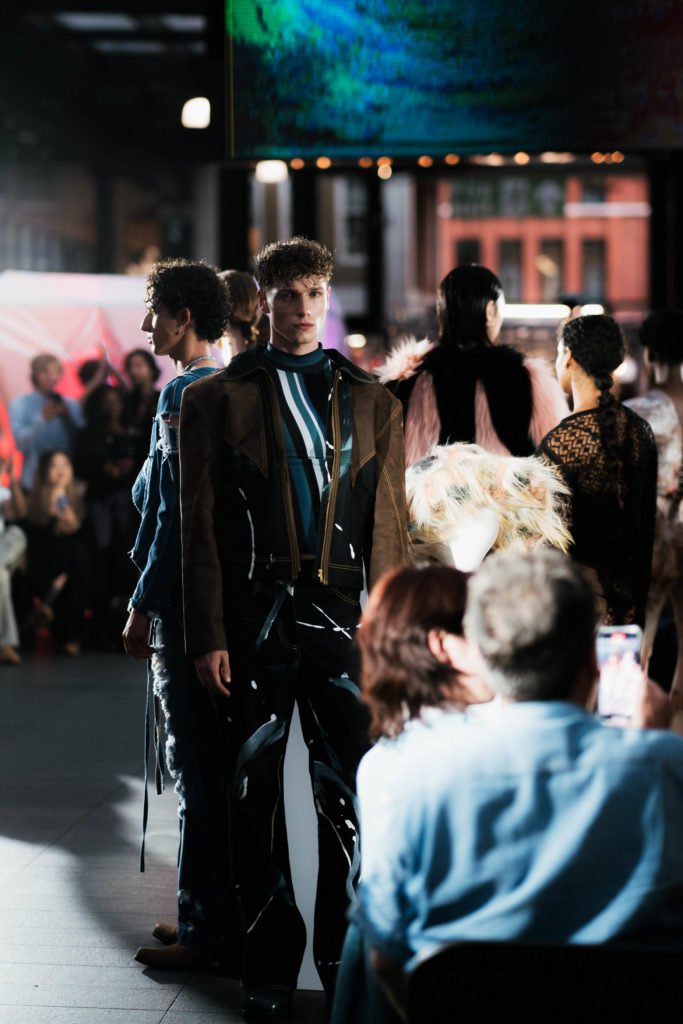
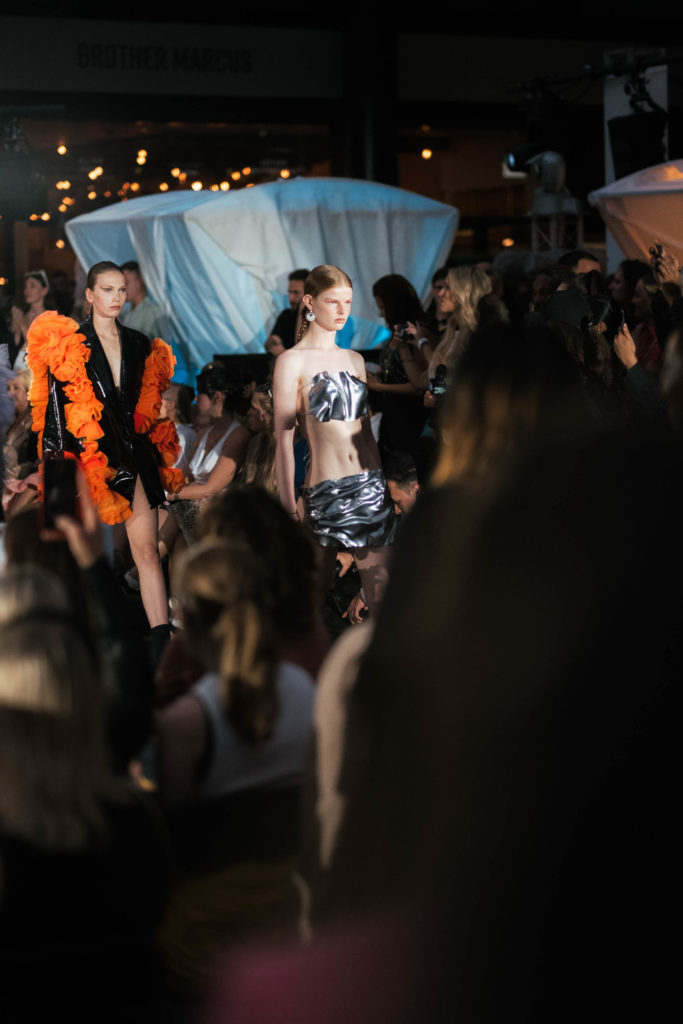
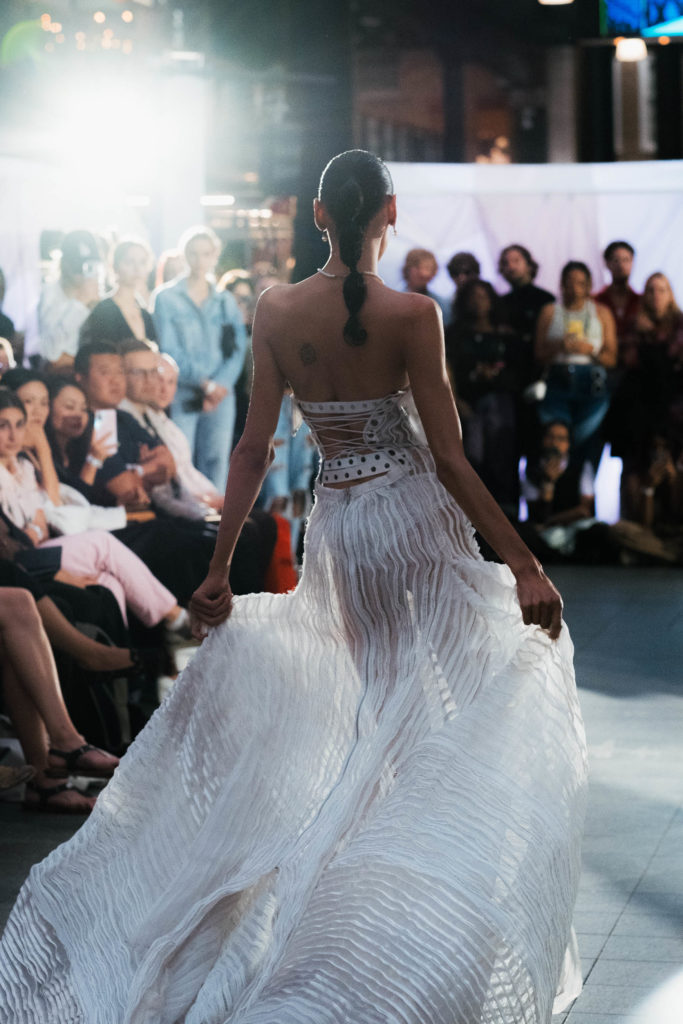
Matt Flynn
The showcase featured interviews with the designers and creators, all united in their mission to revolutionise the future of fashion. Passionate about combining community, processes, techniques, and technology, their dedication to helping create a better industry and world was truly inspiring.
Hannah from Alterist said, “We hope to be a home for all emerging designers within the upcycling space. We want to continue our mission to reduce textile waste and build a positive impact on the planet.”
George Oxby and Angus Cockram from AGRO Studio shed light on the joy and challenges of repurposing materials. “It’s definitely a fun challenge because our job is multifaceted,” Angus added, illustrating their creative process.
Watch the full showcase video here:
Credits to the brilliant minds behind the showcase:
Art direction: Lee Lapthorne, ON/OFF; Styling: AGRO Studio – George Oxby and Angus Cockram; Casting: Sarah Whisker; Production: Congo Blue; Digital Film: Oscar Keene; DJ Set: Jono Jury; Hair by Mark Woolley, Electric Hair, and L’Oreal Professionnel ID Artists; Make-up by Mus Emin.
Designers:
Clementine Baldo, Joshua James Small, Maximilian Raynor, Gyouree Kim, AGRO Studio, Master Bunny, Raquel De Carvalho, Anciela, Buerlangma, Ewelina Szymanska, Florentina Leitner, Kata Haratym, Brian De Carvalho, Maison Lumiere, Paloma Suarez, Cameron Hancock, BELLADONIS, Oscar Keene.
Digital garments:
Oscar Keene, Stephy Fung, Institute of Digital Fashion, Diane Wallinger, House of Autonomy, Roksanda.
Digital Videos / Stills:
Institute of Digital Fashion, The Fabricant, Syky, Stephy Fung, House of Autonomy, Diane Wallinger, Pearl, Sam J, Jacqueline Jade, Morchen, Kapers, Leanne Roksanda, Selene, Miss Mojo, Chrryt, Laura Troncota, Magdalena Mitusinska.
A huge thank you to Feral Film and Broadcast, UAL: London College of Fashion, and our core partners C-Screens and Spitalfields for making this amazing event a reality.

